
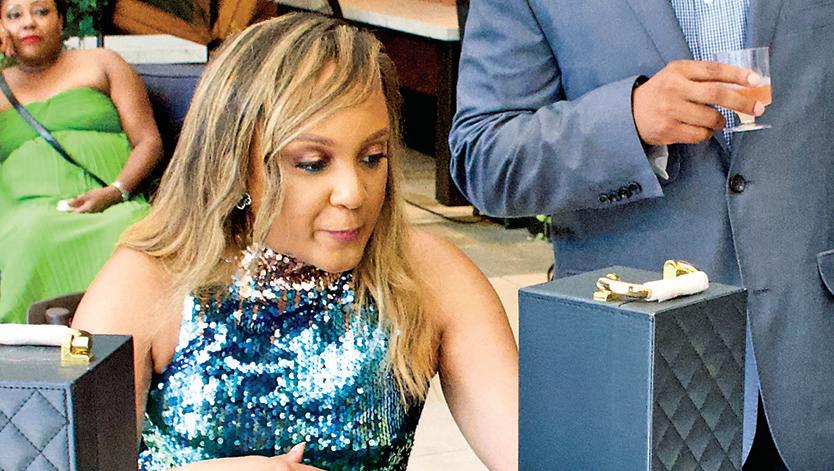





By Gloria Ross St. Louis Public Radio
Henry Givens Jr., the university president whose name became synonymous with HarrisStowe, the college he rescued, transformed, nurtured and led for more than three decades, has died. He was 90.
In a 1993 profile, Givens said it was “a pleasure to work in my own town, among the friends that I grew up with.”
He grew up in St. Louis’ storied Ville neighborhood, 10 minutes from the small teaching college that he would lead for 32 years. When he arrived in 1979, many thought the school was on the brink of extinction. Givens had other ideas.
During his tenure, Harris-Stowe’s student enrollment tripled, one building morphed into seven, and the single elementary education degree it offered grew to 14 baccalaureate programs.
Givens, who once said he never dreamed he could be a university president, died Tuesday, July 20, 2021 at his home in St. Louis of unknown causes.
He was always keenly aware of why and for whom he worked.
“If this place closed down, 98 percent of our students wouldn’t be able to go to college,” he said in his profile in “Lift Every Voice and Sing: St. Louis African Americans in the Twentieth Century.”
Givens wasn’t about to let that happen on his watch. Services are pending.
Givens grew up at 4349 N. Market St. in the Ville, once the city’s Black cultural center. Acclaimed Black historian Julia Davis, for whom a library is named, lived on his street. She taught Givens at Simmons Elementary School, which he described as “the best elementary school in the city of St. Louis.” He felt similarly about Sumner High School, from which he graduated in 1950.
In 1954, as Givens graduated from Lincoln University in Jefferson City, the Supreme Court struck down school segregation — and Stowe Teachers College for Black students was folded into white Harris Teachers College. The Stowe name disappeared and did not reclaim its rightful place alongside Harris until 1976.
Former U.S. Rep. William Clay Sr. had known Givens since they were in high school — even though the two did not attend the same school.
“He was energetic and industrious and was part of this community,” Clay said. “… He was very supportive in organizing ward organization and was the most dominant political factor in force in St. Louis for 50 years.” Clay said Givens was involved in a variety of community activities throughout his life.
“He was a fantastic individual in the community,” he said.
Right out of Lincoln, Givens began teaching
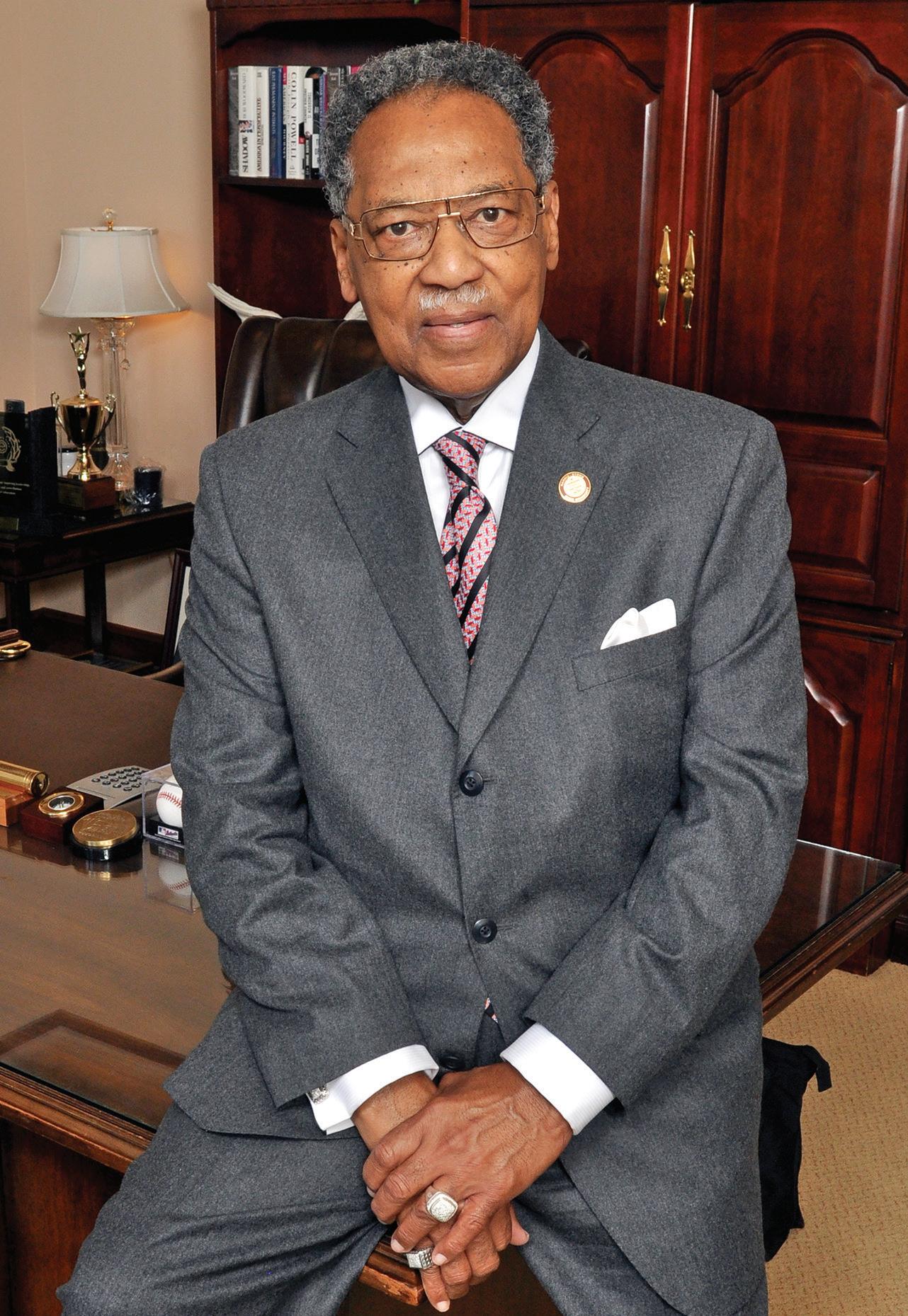
fifth and sixth grade and physical education at the old Douglass School in Webster Groves. He was the school’s only male teacher.
“I loved it,” he said, but he was about to become a full-time administrator.
To integrate Douglass, administrators wanted a program “unlike anything in the nation” to attract white students.
He introduced team teaching and multiage grouping of students. Then he sold the new concept to the community. White teachers and students flocked to the
By JoAnn Weaver
The St. Louis American
A new era in north St. Louis County health care began on Tuesday with a blessing and ribbon cutting at the Mercy Clinic Primary Care and Women’s Health facility in Ferguson. The first day of patient care will be Monday.
The new 5,500-square-foot space at 9180 West Florissant Ave. will serve families of Ferguson and surrounding communities with adult, pediatric and women’s health services.
“This has been an opportunity for collaboration and partnership that will benefit Ferguson residents for decades and generations to come,” Ferguson Mayor Ella Jones said.
The health and well-being of a community starts with the health of its people, according to the 2021 National Health Disparity report,
See MERCY, A7

Dr. Nana Atsina (center) and Donn Sorensen, Mercy executive vice president, shared ribbon cuttung duties during a ceremony on Tuesday at the Mercy Clinic Primary Care and Women’s Health facility in Ferguson as community members and employees look on.
In a year that has challenged the region’s health care industry unlike any other in a century, four health care professionals have been honored with St. Louis American Foundation Excellence in Healthcare awards. They will receive their awards during a virtual event on July 29.
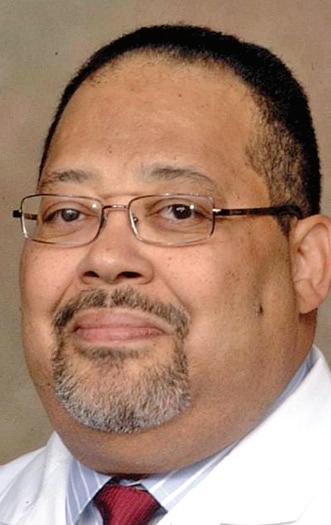
Damon Clines, MD is a community based Gastroenterologist and Hepatologist, practicing in St. Louis, Cape Girardeau and Southern Illinois. He serves as an assistant clinical professor in the division of internal medicine at the St. Louis University Health and Science Center. His clinical interests include viral Hepatitis and Colorectal cancer. He also serves the community through his ambulatory surgery center, the Gateway Digestive & Liver Center, which is the only such organization in the state to be 100% minority owned. He volunteers at local health fairs and community events and informs the community about the benefits of getting a colonoscopy and the early detection of health risks that colonoscopies can provide. He also educates the community about hepatitis and the risk of getting tattoos at community events and through public service work.
Blottie Ussery, RN is a registered nurse at Ranken Jordan Pediatric Bridge Hospital. When she first visited a hospital as a child, she knew then that she wanted to be a nurse and to work with children. She graduated from Florissant Valley Community College
St. Louis County’s Black millennials earn less, study shows
By Karen Robinson-Jacobs
Black millennials in St. Louis County with a bachelor’s degree on average earned about $23,000 less than their non-Black local counterparts in 2019, according to a new study. Experts predict the ongoing pandemic will further widen that gap. On average, Black millennials in St. Louis County with a bachelor’s degree earned $44,155 annually two years ago, according to Lending Tree subsidiary Student Loan Hero, which analyzed data from the U.S. Census American Community Survey. By comparison, the average income for non-Black millennials in the county with a bachelor’s degree was $66,769 per year. That income disparity contributes to a persistent “wealth gap” between Blacks and other ethnic groups. And some experts fear the pandemic’s blow to the economy, especially in sectors that employ large numbers of Blacks, will make matters worse.

Brandy’s daughter Sy’rai Smith follows mom’s musical footsteps
Like mother, like daughter. The apple didn’t fall far from the tree for Sy’rai Smith, who is preparing to release her own music.
Smith, daughter of Grammy award-winning singer Brandy, plans to drop an EP. She has been sharing her musical ambitions consistently on social media. She’s posted a TikTok of her and her mother in what looks to be a studio.
This may be her first full project, but she and her famous mom have collaborated before on a song. On Brandy’s seventh studio album “B7,” which was released last year, Smith is featured on the song “High Heels.” That was Smith’s commercial debut.
Brandy was excited to work with the budding artist and praised her daughter’s talent.
“Just beautiful to see her grow into this beautiful musician, this young artist that’s coming into her own.”
to] give her the space to find her own sound, find her own path and just be here in the wings whenever she needs me. But I’m just so proud of her.”
It hasn’t been announced when Smith will release the project.
Keyshia Cole’s mother overdoses on 61st birthday, dies
Frankie Lons, Keyshia Cole’s biological mother, died on Monday, July 19 after a decades-long struggle with addiction.
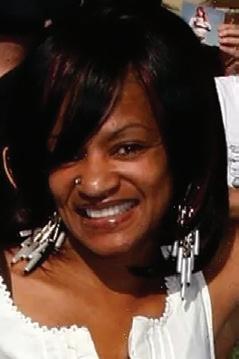
Brandy told The Talk “It’s my job to teach her everything I know about this business and about singing. But at the same time, [I want
Cole’s brother Sam told TMZ Lons overdosed Sunday in her Oakland home. It was her 61st birthday. While partying, she took drugs and relapsed on her “long, hard road to sobriety,” he said. He said he checked in with Lons daily and at tempted to help her stay clean. Her battle was documented on television, social media and other platforms. She is most remembered from Cole’s reality television series on BET, “Keyshia Cole My New Life.”
Last year, Lons remained sober for 60 days. It was something Cole and family were very proud of. Cole hasn’t pub
licly commented on her mother yet.
Leyna Bloom first transgender woman on SI Swimsuit Issue cover
Leyna Bloom made history becoming the first openly transgender woman to cover the Sports Illustrated Swimsuit issue.
Bloom’s cover is one of three. The others feature Megan Thee Stallion and Naomi Osaka It was previously announced that Bloom is the first trans model of color to appear in the magazine. Meg is the first rapper to cover the issue. Osaka is the first Haitian and Japanese woman and first Black female athlete to grace the cover.

“This cover and this moment represent what it looks like in the future,” Bloom told Page Six, who announced the news.
She and Tyra Banks, the first Black model featured on a solo cover of the issue, have been communicating.
male at birth, is also in this year’s publication.
Snoop Dogg’s daughter, Cori Broadus, addresses body shamers
Earlier this year, Snoop Dogg’s daughter Cori Broadus revealed a suicide attempt as she struggled with mental health and hurtful messages she receives on a daily basis. Broadus said people constantly deliver messages saying she’s ugly, fat, and dark. It resulted in her seeing herself differently.

Bloom’s cover comes as more inclusion is happening with the publication. Last year, Valentina Sampaio became the first trans model to appear in the swimsuit edition. Bloom is the second. Lewis Freese, a nonbinary model assigned
She’s since risen above, but the insults continue.
Recently, the 22-year-old shared a message from someone suggesting she opt for a tummy tuck and breast reduction because she can afford it. Broadus clapped back at the user and said, “[laughing emojis] like what y’all b so miserable on here [tearing up emoji].”
She then went on to proudly show off her body and wrote, “Like I don’t know what I’m suppose to do my s**t just big as f**k y’all be annoying on here, oh she 2 big oh she 2 skinny oh she this oh she that..


















































By Sophie Hurwitz
The St. Louis American
Monique Jamison, 32, works full time at Raising Cane’s and has worked at fast food restaurants for most of her life.
During that time, she has struggled to support her son, often lived without steady housing and worked for pay rates that barely cover her bus pass and electricity bill.
“Sometimes, it was like, okay, take care of my son, or take care of bills,” Jamison said.
“Feed me and my son, or pay the electric [bill]. I’d rather feed my son, so … I had to sit there and be homeless and stay in somebody else’s house.”
The COVID-19 pandemic made things worse, Jamison said, as conditions in the fast food industry worsened.
“We’re running around like chickens with our heads cut off,” she said.
Kitchens are understaffed and restaurants are offering larger hiring and referral bonuses in order to stay open, workers say. Jamison says she sweats in her mask in the 90 degree kitchen.
Meanwhile, the federal minimum wage has remained at $7.25 per hour since 2009. So Jamison, along with other St. Louis area fast-food workers, is with Show Me 15—the
Missouri branch of the Fight for $15 campaign — and striking.
“Giving out bonuses is not changing anything. Trying to get your workers to refer people so they can get bonuses to get more workers in … they’re only doing that because nobody wants to work,” Jamison said. She said her restaurant is offering $200 referral bonuses if workers find people to recruit. Signs offering similar bonuses are all over the state.
So are indications of worker discontent like at a temporarily-closed Jack in the Box in Arnold.
A sign on the door read “So sorry for the inconvenience. But I’m currently short staffed and the crew members I do have are rebelling against me because the new hires I’ve hired made more money than them.”
On Tuesday, fast-food workers in St. Louis joined others in Asheville, Charlotte and Durham, North Carolina, Charleston, South Carolina, Detroit and Flint, Michigan, Houston and Milwaukee in striking for a $15 minimum wage and union representation. Marchers gathered on Lindell Boulevard, shutting down the drive-thru of a McDonald’s for 30 minutes during the lunch hour as workers yelled directly into the
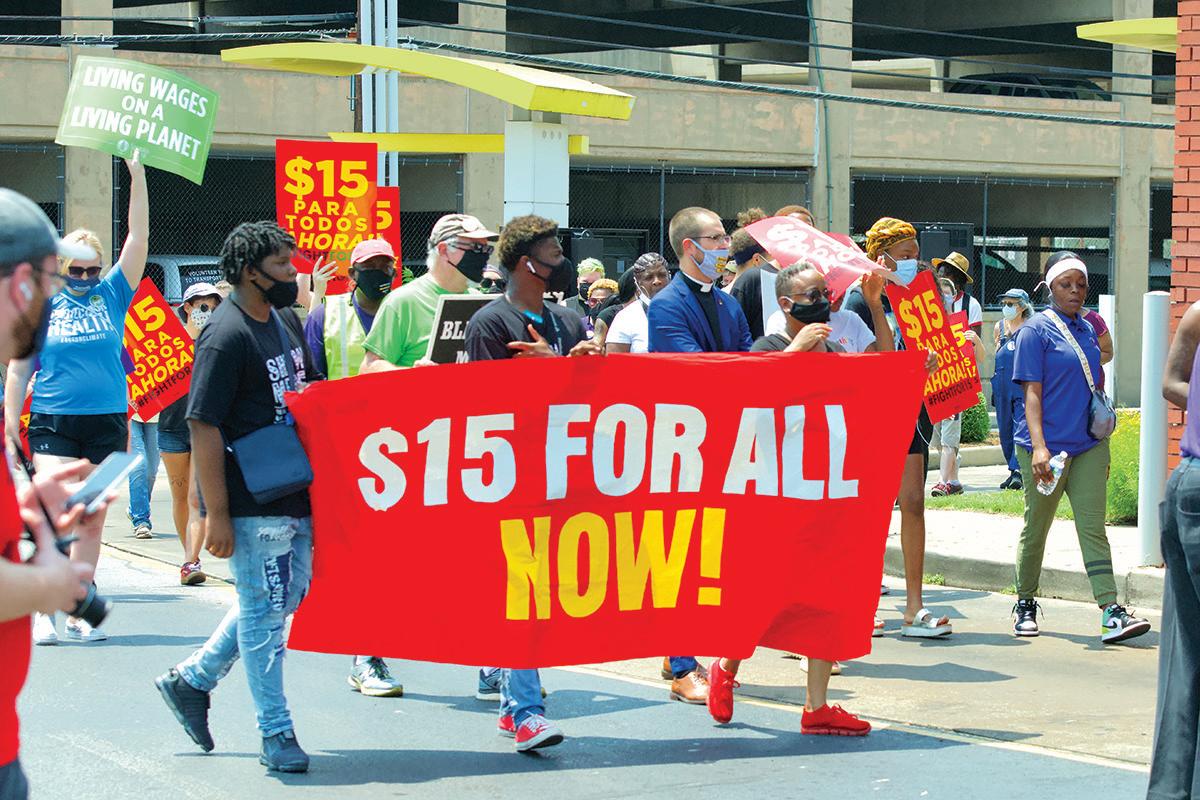
Holmes said, she lived with her granddaughter, and worried about bringing the virus home.
“But I worked anyway through the pandemic, because if I didn’t, we wouldn’t have a place to live,” Holmes said. After the morning’s demonstration, a group of workers at the Lindell protest staged another walkout at Krab Kingz in the Loop.
Nicole Rush, assistant manager at Krab Kingz, said the pay there is also low.
“We don’t have no benefits. … We don’t got no sick days, we don’t got no paid vacation. The kitchen is so hot … we don’t have no air in the kitchen,” Rush said.
The workers at Krab Kingz have not staged a walkout or a strike before, but working with organizers across the nation and other fast-food restaurants inspired them.
“We need to get more respect,” Rush said. “Right now, when we try to talk to them and tell them what’s going on, they just brush us off, like we’re not important.” She said her coworkers keep
drive-thru order speakers, “We want our money!” Members of SEIU Local 1 joined others from the Fight for $15, Jobs with Justice and the Coalition of Black Trade Unionists.
“Everybody’s like, ‘Oh, it’s fast-food, it’s nothing’ — well, it’s something to us,” Jamison said. “I’m not getting paid correctly for the work and effort
that I put in.”
Francis Holmes, 58, spoke at the rally. She’s been working in fast-food since she was 13 years old.
“When I started working, the [Missouri] minimum wage was $3.55. It’s only gone to $10.30 now. So, you calculate how much money they didn’t give us for the past 40 years,” Holmes said.
The state’s current minimum wage was increased to $10.30 an hour this year, after the passage of Proposition B. Even so, it’s estimated that a person with one child in the St. Louis area would need to make $29.81 an hour in order to provide for their family’s needs — nearly three times the current minimum wage. During the pandemic,
In 2020, I was part of a coalition of grassroots organizations which came together with the goal of expanding Medicaid.
As an organizer at Action St. Louis Power Project, I co-led a field team of 20 canvassers and phone bankers who knocked on more than 40,000 doors across the city to engage voters in this critical moment. Our efforts supplemented the thousands of signatures collected in support of Medicaid expansion from almost every congressional district in the state.
When the measure hit the ballot box in August 2020, Missouri voters spoke loud and clear with the passage of Amendment 2 in favor of expanding Medicaid. This was a huge victory for the 275,000 Missourians who are now eligible for access to health care that they’ve been repeatedly denied by our state legislature.
Almost a year later, Gov. Mike Parson and our state legislature have failed to uphold the will of the people.
It is the duty of our elected officials to carry out the will of the people, but most of our legislators have moved in direct opposition. Our gutless governor, who is more concerned with political clout than serving his constituents, signed on the dotted line. As of August 2020, the expansion of Medicaid is written into our state constitution. It’s not a request - it’s our right.
Uninsured Missourians are struggling to tread water and Republican legislators are sailing by on their boats stocked with life jackets. Their actions have made it exceedingly clear that they don’t care if working people and their families make it through this pandemic.
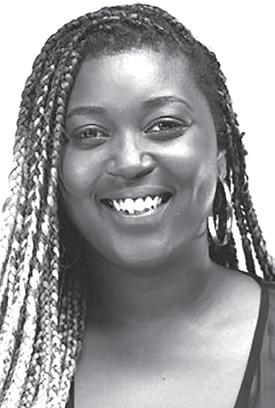
Last month, Parson and the legislature decided to move the FY2022 budget forward without appropriating funds for Medicaid expansion. As careless as they are cowardly, Republicans in Jeff City forced this issue into court. This left people already on the verge of crisis uninsured and in the dark as to what the future holds. We must now center on who bears the burden of our state not expanding access to health care while COVID-19 rates rise rapidly.
Black folks make up 11% of the state population, but COVID-19 cases among us make up about 25% of total cases. Wide disparities exist in vaccination rates, with just 17% of Black Missouri residents fully vaccinated. This is well below the 32% statewide average. The weight of harm inflicted upon people who must navigate surviving a pandemic without reliable care is crushing. No one should have to feel that.
This week, the Missouri Supreme Court could decide on Medicaid Expansion. While there’s hope that our courts will rule to uphold the will of the people, we shouldn’t have to drop a single dime or spend any additional time behind a legislative body that has proven it’s only good for dragging its obstructionist feet.
In last week’s oral arguments, lawyer Charles Hatfield said, “frequently, [the courts] have had to step in to tell the legislative branch that they’ve exceeded the authority that the people gave them.”
Time and time again, people of this state have exercised their rights, and in response Republican legislators lord their power to impede progress. With the fate of 275,000 Missourians in its hands, the court will decide if Medicaid expansion will be upheld or overturned.
In the meantime, we the people must continue to fight and hold firmly to what we know: healthcare is our right.
Milkayla Allen (they/them) is an organizer for Action St. Louis and Action St. Louis Power Project, grassroots organizations focused on building Black political power in our region.
By Janice Ellis
The state of Missouri, the “Show Me State,” is in the heart of America.
In addition to the sass and symbolism the nickname and location connote, what a great geographical and strategic position to be in — to lead, to bring about positive improvements in the lives of its citizens and be a great example for our nation. How did Missouri come to be known as the “Show Me State?” While its origin is uncertain, there are several stories. But irrespective of the exact origin, the nickname has stuck and is flaunted proudly in casual and serious conversations among Missourians. Why not let it propel the state to greatness? While proclaiming something must be shown to us, why aren’t we showing others?
What is the “Show Me State” showing its citizens and the nation? Are the policies and actions being adopted achieving the greatest good for Missourians? Should those policies and practices be emulated as good examples for the nation? Let’s look at a few critical areas. The first that comes to mind is how the state of Missouri has responded to the coronavirus. As of this writing, the state has one of the lowest vaccination rates among states in the nation. As a result, the state is experiencing the highest COVID-19 hospitalizations and second highest rate of new infections in the country from the Delta variant. It wasn’t that long ago that vaccines were being returned because there was no demand for them. Where does the blame lie for this detrimental turn of increased cases? There is blame to be spread. From policy, or the lack thereof, to the persistent disinformation, and to those who simply refuse to take the vaccine or wear a mask. When there is a crisis of pandemic proportion, we all have responsibility and a role to
play. The response has been a disservice to Missourians. What missed opportunities to be an example for the nation. Ineffectively fighting the coronavirus is symptomatic of a larger health care delivery problem. There is the perpetual challenge of providing health care services to some of the neediest Missouri citizens, including mental and physical health care for the homeless. Citizens of Missouri voted for Medicaid Expansion to enable the state to do just that. But guess what? Many of the very elected officials you voted vote to represent your interests have ignored and subverted the will of the people by refusing to pass legislation to fund Medicaid Expansion, which would provide those needed health care services. Why?
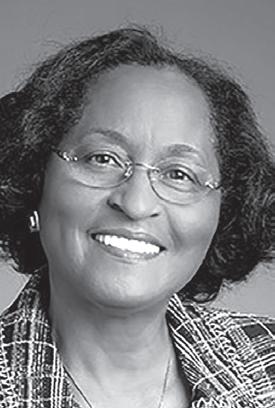
Failing to provide good healthcare options is not the only area where the “Show Me State” has little to brag about. The state also has a serious deficit of affordable and available housing. According to the National Low Income Housing Coalition, Missouri has a shortage of 122,075 homes. How can this be when the Missouri Housing Development Commission, which oversees affordable housing, has hundreds of millions of unrestricted dollars that could be applied in a more urgent way to address the growing housing shortages for low income families?
As you might expect, the housing problem is especially acute in Missouri’s largest cities of St. Louis and Kansas City. But there is also a shortage of affordable housing in smaller cities and rural communities across the state. Even more critically are the housing needs for a growing homeless
By Ben Jealous
A year after the death of the great civil rights icon
John Lewis, a group of Texas Democratic lawmakers is following Lewis’s lifelong call for people to make “good trouble” and “necessary trouble” to secure equality and justice for all.

Congressional Democrats should bring the same level of commitment to resisting and overturning a new wave of voting restrictions that voting rights activist Stacey Abrams has labeled “Jim Crow 2.0.” This is why dozens of Texas lawmakers are in Washington, D.C. this week.
Texas is the latest Republicanrun state where legislators and the governor are trying to impose new voting restrictions—banning drive-through and 24-hour early voting, restricting distribution of absentee ballots, imposing new voter ID provisions—that they hope will make it harder for Democrats to win future elections. Their voter suppression laws are aimed at Black and brown voters and others more likely to support Democratic candidates.
Republican officials are also trying to make former President Donald Trump happy by giving credibility to his false claims that the 2020 election was stolen from him. They’re using his lies about “election fraud” and “election integrity” to justify new restrictive voting rules.
In Texas, Republicans control the state House and Senate.
population, which has been more exacerbated by the pandemic.
There is no excuse for not being able to provide adequate shelter for the homeless.
Let us not forget about how the “Show Me State” fairs when it comes to crime.
Let the statistics speak for themselves. “Missouri has the fourth-highest murder rate of 11.3 murders per 100,000 residents. Murders in Missouri are disproportionately concentrated in metropolitan areas – about 90% of murders committed in 2017 in Missouri were committed in metropolitan areas. St. Louis and Kansas City are two of the most dangerous cities in the United States.”
But all major cities in Missouri are not blemished by high crime rates.
What further confounds the apparent inability or the lack of will to address these debilitating problems in the “Show Me State” is the fact that Missouri has a growing surplus of available funds, reaching record levels, that can be applied to help solve them.
Rather than holding back that record surplus, which belongs to taxpayers, or bickering and debating about how it should be or should not be spent, why not apply some of those dollars to obvious areas that so critically need resources, like the ones identified above. There exist many ways to get it done. No need to reinvent the wheel.
Missouri, like America, has many things that are good, but there is much more that can be done to make life better for its citizens.
Janice Ellis is author of award-winning books “From Liberty to Magnolia: In Search of the American Dream” and “Shaping Public Opinion: How Real Advocacy Journalism Should be Practiced.” She analyzes educational, political, social and economic issues. This commentary was published by The Missouri Independent.
Hard-right GOP Gov. Greg Abbott is eager to do Trump’s bidding. Back in May, Texas Republicans tried to push their election bill through the House just before the close of the legislative session.
Because the Texas House is required to have two-thirds of its members present to conduct official business, Democratic legislators stopped the bill from passing by walking out of the chamber.
But Abbott is so set on getting his new voting law that he ordered legislators to come back into session this month to push it through. To prevent the state’s Republicans from forcing new voting restrictions into law, more than 50 Democratic legislators left the state.
Abbott and Republican
n To prevent the state’s Republicans from forcing new voting restrictions into law, more than 50 Democratic legislators left the state.
Senate leaders have threatened lawmakers with arrest to try to force them to attend the session. And he has said he will keep calling special sessions until he gets his way. That’s why the Texas legislators came to Washington, D.C. They brought an urgent message to members of Congress: the only way to protect voters from voter suppression at the state level is to pass national voting rights legislation.
The House of Representatives has previously passed the For the People Act, which would reverse many new vot-
We’re losing our Black leaders and we need new ones
In the past two weeks, St. Louis has lost three major icons in the community: Hazel Erby, Betty Thompson and now Dr. Henry Givens. I’ve been reading about all of their careers on stlamerican.com, the newspaper and other media outlets. These three were stalwarts in our community. They each had different temperaments and different styles but they all had one thing in common: their love for the Black community in St. Louis. Me and my kids new Betty Thompson personally. She was IN the community day after day. She listened to us. It made us feel good. We need to remember these people and oth-
ing restrictions and includes several priorities specifically outlined by John Lewis during his lifetime, and the John Lewis Voting Rights Act, which would help prevent future voter suppression efforts from taking effect. Both are essential to protect democracy and voting rights. But right now Senate Republicans are using the filibuster to block the For the People Act, and they could do the same to the VRA.
President Joe Biden has just made a strong speech in defense of voting rights. He denounced new voter suppression efforts. And he called for the Senate to pass the For the People Act and the John Lewis Voting Rights Act.
I am grateful that President Biden has called attention to the urgent need for congressional action. Now we need him to use his leadership to get voting rights legislation through the Senate. And if Republicans continue to block it using a filibuster, he must work with Senate leaders to break through that obstruction.
John Lewis nearly died in the struggle to pass the national Voting Rights Act. He dedicated his career in Congress to defending it. I am steeling myself for the disgust I will feel when Republican officials praise him on the anniversary of his death at the same time they are undermining the cause to which he devoted his life.
Texas Democrats are honoring John Lewis by making good and necessary trouble. It is time for Democrats in Washington, and any Republicans committed more to country than party, to do the same.
Ben Jealous serves as president of People For the American Way.
and
ers like them who have passed. Our children should know why they were so beloved, and why they were so important to us as Black people. St. Louis is certainly behind when it comes to its treatment of Blacks, but just think how far behind we would be if we didn’t have the collective work of these three. I pray that people remember their work. I know we have gems like Mr. (Michael) McMillan, but we need more. Sometimes when we do have gems they leave town for bigger towns and better gigs. We need to uplift those who uplift us. Thank you and God bless Hazel, Betty and Henry. Loretta Stevens Dellwood


for
than a
Deadline to apply is August 3
The Greater St. Louis Association of Black Journalists (GSLABJ) will present two scholarships of $2,500 each to 2021 graduating high school seniors or incoming college freshmen. Families with students who graduated from St. Louis-area high schools last spring or this summer, and will be entering college this fall, are invited to apply.
“We usually present scholarships to students in our longrunning Minority Journalism Workshop, but this year is a little different,” said Cara Anthony, GSLABJ president and a Midwest correspondent with Kaiser Health News.
“Although we weren’t able to hold a workshop due to pandemic issues, we still want to support St. Louis-area students who dream of careers in journalism. Many of our members started their journalism careers thanks to our workshop and our
scholarship support, and that is a tradition we aim to honor and continue.”
Applicants must provide answers to two prompts: “Why are you applying for this scholarship?” and “What impact do you hope to have on the media industry?” Each answer should be no longer than 250 words and submitted via email. A college acceptance letter and a high school transcript must also be provided.
Incoming fall college freshmen who participated in journalism-related extracurricular activities in high school are encouraged to include those activities in their email applications.
The deadline to apply is August 3. Send applications and questions to gslabj@gmail.com. Recipients will be selected shortly after the application deadline. All scholarship money will be sent directly to the college or university of the recipients.
By Angela F. Brown
During a recent St. Louis Regional Health Commission patient advisory board meeting, the agenda included an update on Medicaid expansion. One of the representatives said, and I quote, “Yes, we need to talk about that. I’m mad.”
Those words resonated with the other members of the board, as well as those of us who are receiving daily updates on the advocacy efforts for Medicaid expansion implementation. The patient advisory board is comprised of individuals who have no insurance or who have coverage through Gateway to Better Health or Medicaid. Many have health care issues that require routine doctor visits.

After the historic vote in August to approve Medicaid expansion in our state, our advisory board representatives were hopeful for a chance to have new or expanded access to health care coverage. Instead, our legislature failed to appropriate funds for expansion, and our governor withdrew necessary documentation to implement expansion.
The fate of Medicaid expansion implementation is now in the hands of the courts when it should have stayed in the hands of Missourians. As I watch this political exercise unfold, I find myself asking: “How are we centering and responding to the voices of people most impacted in our work?”
A clear majority of voters (53%) approved expansion.
However, a small number of legislators insist they know what is best for the community, though it stands in direct opposition to how Missourians voted. This fight for expansion follows an all too familiar pattern, where institutions fail to actively listen and respond to the needs of our community. It should come as no surprise then, as a result of this fractured trust, the community is “mad.”
How can we prevent a similar outcome for other policy measures and health care improvements? We have seen a new way of leadership from St. Louis Mayor Tishaura Jones. When her team did not receive adequate input from North City residents regarding how to spend American Rescue Plan Act relief dollars, they canvassed at a neighborhood level. They did not assume how to spend millions of dollars in aid. They went directly to St. Louis residents who were disproportionality harmed by COVID, asked for their guidance and listened. We need similar models of accountability at all levels of governance – institutional, local, state and federal. At the St. Louis Regional Health Commission, we are committed to leaning into this charge of centering those most impacted in our decision-making. If we really want to see justice in our lifetime, we need more leaders who are willing to engage in radical listening and power sharing with community. We hope that the Missouri Supreme Court will honor the will of Missourians and implement Medicaid expansion. Angela F. Brown, MPH, is CEO of the St. Louis Regional Health Commission, a nonprofit organization with a mission to increase access to health care for people who are medically uninsured or underinsured.

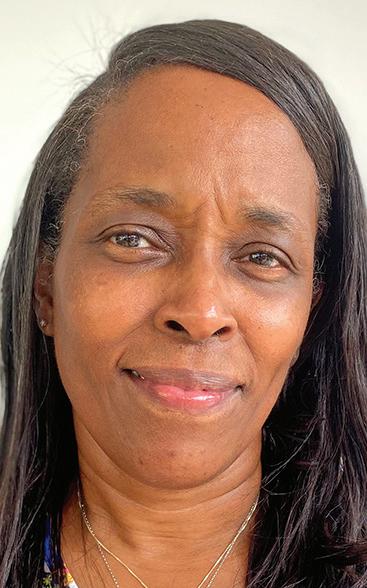
as a registered nurse in 1989 and moved on to serve at St. Louis Children’s Hospital as a staff nurse. There, she cared for children with cystic fibrosis and asthma. She then moved to Strictly Pediatrics Specialty Center where she cared for medically fragile children in their homes, treating those living with chronic illnesses. She
Continued from A1
which gathered data on social determinants evaluated from doctor’s visits to access to healthcare.
“Accessible health care in this community will mean a great deal to mothers who have Mercy
also served as a teacher to the parents and teachers of those children, showing them how to care for their kids and equipment. Ussery joined Ranken Jordan Pediatric Bridge Hospital in 2006, a specialty hospital in St. Louis that cares just for children with medical complexities. She has thrived at Ranken Jordan, earning three nominations for the DAISY Award and is consistently recognized by her peers and leaders for her outstanding work.
Carlita Vasser, MA, BSN, RN, CCN is director and CEO of At Home Care and St. Louis Healthcare Consulting Services. At Home Care works to keep disabled and or seniors living at home independently by assisting with their basic needs. When Vasser saw the
to take public transportation to get to essential places,” Jones said.
Planning for Mercy Clinic Primary Care and Women’s Health in Ferguson began nearly two years ago.
Since its groundbreaking, Mercy has worked with community leaders, stakeholders and residents as part of the Ferguson Community
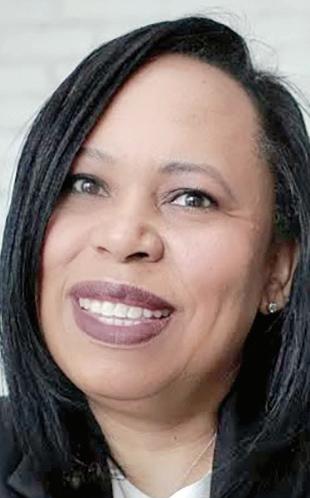
need for more wrap-around partnership with the community in terms of serving seniors’ healthcare needs, she founded St. Louis Healthcare Consulting Services. Through her grant writing, corporate sponsorship acquisitions and program management expertise, she has been the creator of healthcare programs for charitable organizations, churches and nonprofit organizations. Vasser has also used the radio to spread healthcare messages: she is the founder and developer of “Returning to
Advisory Council. Its role was to share plans for the space and serve as a voice for the Ferguson community.
“The transformation of the West Florissant corridor will revitalize the community,” Jones said.
“The great people of Ferguson are going to enter this door for healing and healthcare in just a few days,” Donn

Eden- Keeping God’s Temple Healthy,” a radio and digitally aired health news and education program which reached over 40,000 local listeners through the Missouri Gospel Guild and National Gospel Guild. She has advocated legislatively at national, state, and local levels for the protection of state funds for emergency preparedness and the need for more health-focused grants. Carlita was a Radio One Phenomenal Women Awardee and National Council of Negro Women Missouri Visionary Leader awardee.
Dara Webb is a results-driven healthcare executive with over 15 years of experience in various settings including community health, consulting, and large integrated
Sorensen, Mercy executive vice president and Health and Homes CEO, said.
The life expectancy of Ferguson residents, like other predominantly African American areas around St. Louis, is 10 years shorter than more affluent communities, according to Sorenson.
“Health and Homes determined this area needed help, to be uplifted and needed investments,” Sorenson said.
“The social determinants of health show there is not a lot of healthcare here.”
A future update for the area provided by Health and Homes will include a renovated bus shelter for people waiting for the bus across the street from the new clinic.
“We knew that we wanted a clinic that would serve the community, but we didn’t know that it would blossom into the wonderful structure we have today,” said Mercy Clinic Vice President Tesh Jewell.
“This facility will include
Continued from A1
“With the pandemic, first of all … we see a lot of Blacks are struggling,” said Dr. Terry Daily-Davis, dean of the College of Arts and Sciences at St. Louis’ Harris-Stowe State University. “Some of those jobs we have lost due to the pandemic. And so with that, we’ve lost income.”
Earlier this year, CNBC reported that for white workers, the unemployment rate fell to 5.6% in February. Black and Hispanic workers, however, reported jobless rates of nearly 10% and 8.5%, respectively.
And the statistics were worse for Black women.
Employment for Black women was nearly 10% lower than it was in February 2020, according to CNBC. Employment for white men, white women, and Black men was down 5%, 5.4% and 5.9%, respectively.
As the economy lumbers back to life, “it seems likely

health systems. She is currently the Executive Director of Population Health for Mercy Clinic. Most recently, she was able to put her personal passion for community health into action by leading the COVID vaccine clinics for Mercy Health. Active in the community, Dara holds seats on the boards of the Urban League and CareSTL Health and is a Cabinet Member of the Charmaine Chapman Leadership Society. She provides her expertise to future professionals as adjunct faculty at Webster
more essential health care components than we initially envisioned. I believe this is a center that can help the people of Ferguson work, play, live and thrive, which I am proud to be a part of.”
Members of the Advisory Council, who came together to give their input for clinic services, include leadership from the school districts in Jennings, Ferguson-Florissant and Riverview Gardens.
Community leaders like Jones and organizations like the Boys and Girls Club of Greater St. Louis, next door to the new facility, also participated to ensure the community’s voice was heard.
“Each month, members of this community met together and volunteered their time to give us insight to help us design services that would be offered,” Jewell said. “We are grateful for the voices that came together to create services that will be beneficial to this community.”
that earnings will have risen for Black millennials with college degrees, but their white peers would see their earnings go up even more,” said Kali McFadden, senior research analyst with Student Loan Hero, which helps Americans living with student debt manage and pay off their loans.
McFadden’s research found an income gap between Blacks and non-Blacks with or without a bachelor’s degree.
In 2019, the average income for millennials in St Louis County without bachelor’s degrees was $37,599 for Blacks, about 20% lower than the $45,353 earned by nonBlacks without degrees.
U.S. Labor Secretary Marty Walsh, who was in St. Louis last week [7/16] meeting with elected officials and community leaders, took the opportunity to tout President Joe Biden’s plan to invest in infrastructure -- human and physical -- as an important step in helping address the dollar divide.
“If we don’t continue policies to close the economic
University, Harris-Stowe State University, and Washington University. Her civic leadership program participation with the St. Louis Business Diversity Initiative and Focus Impact Fellows positioned Dara to be selected for the incoming Focus STL - Leadership St. Louis cohort. She is looking forward to this new opportunity and to integrating key takeaways from the program into her daily work.
The St. Louis American Foundation’s 21st Annual Salute to Excellence in Health Care Awards will be celebrated as a free virtual event at 7 p.m., July 29. For additional details and registration, please visit givebutter.com/2021HealthSalute.
The new space will serve as a resource for health and wellness in the community from nutrition to mental health to education. A nutrition center with a nutritionist there one day a week will help with nutrition for disease management, and also nutrition for wellness.
“The most important feature is the holistic nature of this clinic,” Jewell said.
“We are used to thinking in service lines and disease states, which leads to getting a primary physician or addressing a disease once you have it, instead of being intentional about what we can provide to meet the whole person. We also try to be conscious that there are social and economic factors that become barriers to people who are seeking health care.”
The clinic plans to offer parenting classes, care for the caregiver opportunities, smoking cessation and grief counseling.
wealth gap we’re going to see that disparity grow,” said Walsh following a panel discussion on empowering women in the workforce. “If the president’s plan of ‘building back better’ [is not implemented], I think the wealth gap is going to grow, it’s going to get worse in our country, potentially.”
St. Louis Mayor Tishaura Jones, who also attended the event, noted that she’s been “laser-focused” on enacting policies to shrink the gap since her days as treasurer. She suggested residents concentrate on improving their credit scores “so people have the opportunity to participate in our financial systems in a safe way.”
She also said she sees an opportunity to shrink the racial wealth gap through programs that are contained in Biden’s American Jobs Plan.
Karen Robinson-Jacobs is The St. Louis American / Type Investigations business reporter and a Report for America corps member.

Continued from A1
school, which became the model for today’s magnet schools. Within two years, Douglass was fully integrated with a two-year waiting list and top national achievement levels.
He became principal of Douglass in 1967 and subsequently assistant to the superintendent of schools. He earned a master’s degree in education at the University of Illinois-Urbana and a doctorate in urban education and school administration at St. Louis University. He later did postdoctoral work in higher education administration at Harvard University.
A changing mission
In 1973, Givens became the first African American assistant commissioner of Missouri’s Department of Education, where he orchestrated the merger of the Berkeley and Kinloch school districts with the Ferguson-Florissant School District. He left the commission to accept the job of president of Harris-Stowe State College in 1979, just as control of the financially ailing school was being transferred from St. Louis Public Schools to the state. State Sen. J.B. “Jet” Banks, once Missouri’s highest-ranking Black official, led the legislative effort.
Most observers thought Givens would be overseeing Harris-Stowe’s demise. Instead, he built the college into a midtown landmark and community meeting place.
There was only one building, which formerly housed Vashon High School, and the school offered only an elementary education degree.
When he retired in 2011, the original building bore his name because he had changed the landscape of the school’s midtown location and created a full-fledged campus. His vision and shrewd negotiating added six buildings,
including two residence halls and a student center to accommodate approximately 2,000 students.
He paid the city $10 for the land under the decaying Laclede Town Federal Housing and $10 for the old Vashon Community Center and its three surrounding acres. Later, he persuaded the state to give the school a great deal on a building to house a satellite business school in south city.
It took 12 years to persuade the legislature to permit HarrisStowe to offer more degree programs. He succeeded in 1993, with the help of U.S. Rep. William Lacy Clay Jr., then a state senator, who wrote the legislation.
“We talked regularly, whether I was in D.C. or St. Louis, we called each other and spoke on a regular basis — probably once a week just to check in,” Clay Jr., said.
“He was very intellectual, precise and caring of others. He cared about his community, cared about the people in it, he cared about the young people who came through those doors at his university and he always had time for others.”
With the restriction lifted, Givens quickly began raising funds from local business and community leaders. The school added 13 degrees, including criminal justice, business administration and urban studies.
In 2005, with its expanded curriculum, the school replaced “College” with “University.”
“We were very close and had a phenomenal relationship,” said former Harris-Stowe President Dwaun J.Warmack.
Warmack, who now serves as president of Claflin University in Orangeburg, South Carolina, credits Givens with landing him his first seat on a corporate board.
“He was more than just a mentor. He was a father figure. We talked every Friday, including last Friday.”
“Dr. Givens’ remarkable achievements make him an iconic St. Louis leader,” said Dr. Donald M. Suggs, Publisher of The St. Louis

American
“He was an innovative educator and administrator, a visionary whose legendary determination and hard work helped lead to his remarkable successes that included global projects. But it was his undeterred dedication to Harris-Stowe and its mission to provide greater opportunity to thousands of the underserved that places him high in the pantheon of extraordinary St. Louisans.
“I hold him in high esteem for his passion and commitment to service, but I also cherish the long personal friendship I enjoyed with him and his beloved wife, Belma. Although I am deeply saddened by his passing, I will never forget him nor all the great work he did for others.”
Sen. Roy Blunt said Givens “had a unique understanding of how education could dramatically impact people’s lives.”
“He worked tirelessly to expand the reach and reputation
of Historically Black Colleges and Universities. I announced my first run for the Senate at Harris-Stowe State University and was on the campus with Dr. Givens many times during his presidency.
“I will miss seeing him at the annual Martin Luther King, Jr. Celebration in St. Louis and benefitting from his advice. He was a good friend and an exceptional role model.”
Two campuses at once In 1987, Givens succeeded in getting Harris-Stowe the federal designation as a historically Black institution. It’s one of two in the state, the other being Lincoln University, Givens’ alma mater.
The move was not made to erase half of the school’s heritage; it was another effort to keep the school afloat. The status made Harris-Stowe eligible for as much as $2 million annually.
That same year, Gov. John Ashcroft (whose nomination
for U.S. attorney general he would later oppose) asked Givens to take over his financially strapped alma mater. For months, he split his time between the two campuses, working six days a week.
“I didn’t even know where I was,” Givens said in “Lift Every Voice.” But he reduced Lincoln’s projected deficit from $1 million to $50,000.
Helped by the business relationships he cultivated, he became a prolific fundraiser.
The year prior to his retirement, Givens led a $45 million fundraising campaign, the most successful in the school’s history.
But sometimes, the business relationships were fraught.
For 30 years, prominent Black leaders and members of Civic Progress, executives from the region’s largest companies, met monthly to discuss racial issues. The meetings ended in 1998, when Givens and other group members said they were not treated as equal partners in
the dialogue. St. Louis’ racial divide was his only disappointment, he said in his profile.
“We’re doing a lot of good,” he said, “but St. Louis is not going to be a great city until racism is wiped out.” No matter the obstacle, Givens persevered and willingly shared his optimism and expertise.
From its inception in 1986 and for the next 25 years, Givens chaired the Dr. Martin Luther King Jr. Statewide Celebration Commission. It became the second-largest celebration in the nation paying tribute to King. He served as a consultant for the State Department’s American School in Lima, Peru, and was recognized by more than 100 national, state and local organizations for his service.
Proud to be
Henry Givens Jr. was born in St. Louis in 1931, the third of Henry Givens Sr. and Catherine Lucille Johnson Givens’ four children.
His mother was a homemaker whose activities included volunteering with the Pine Street YMCA. The “Y” ran Camp Rivercliff near Bourbon, the first camp in Missouri operated by and for African Americans. It’s where Givens spent his childhood summers.
His father worked multiple jobs to support the family — driving for a printing company, repairing radios and TVs, even deejaying local dances, sometimes assisted by his sons. The dapper Givens had a singular work path. He said choosing education was his “proudest achievement,” second only to marrying Belma Evans in 1955 and raising their children. His siblings, Robert T. Givens Sr., Leon Arthur Givens and Armetta Givens Whitmore, died earlier. Survivors include his wife; a son, Keith Givens of Phoenix; a daughter, Stacy Givens of St. Louis; and three grandchildren.
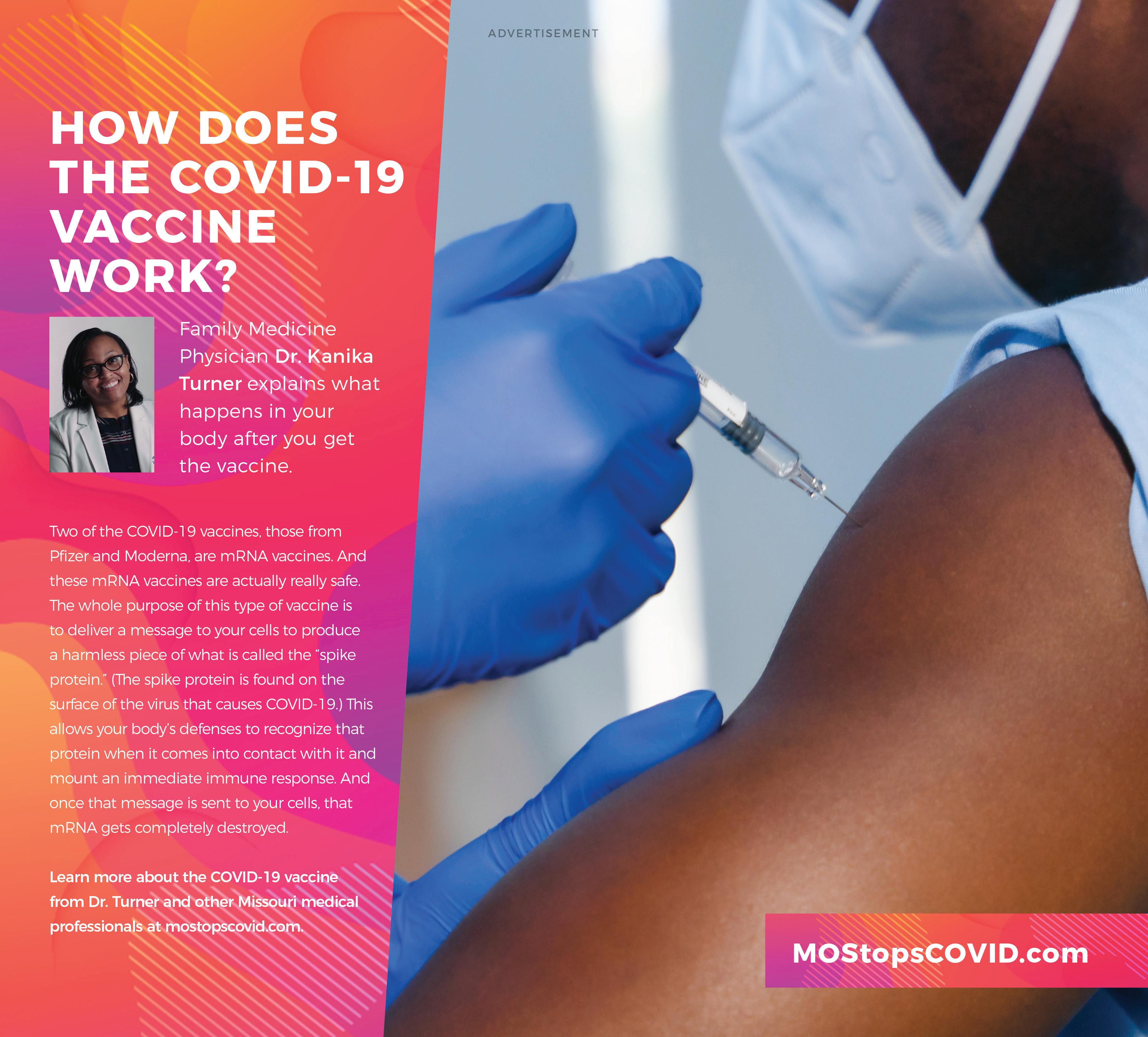
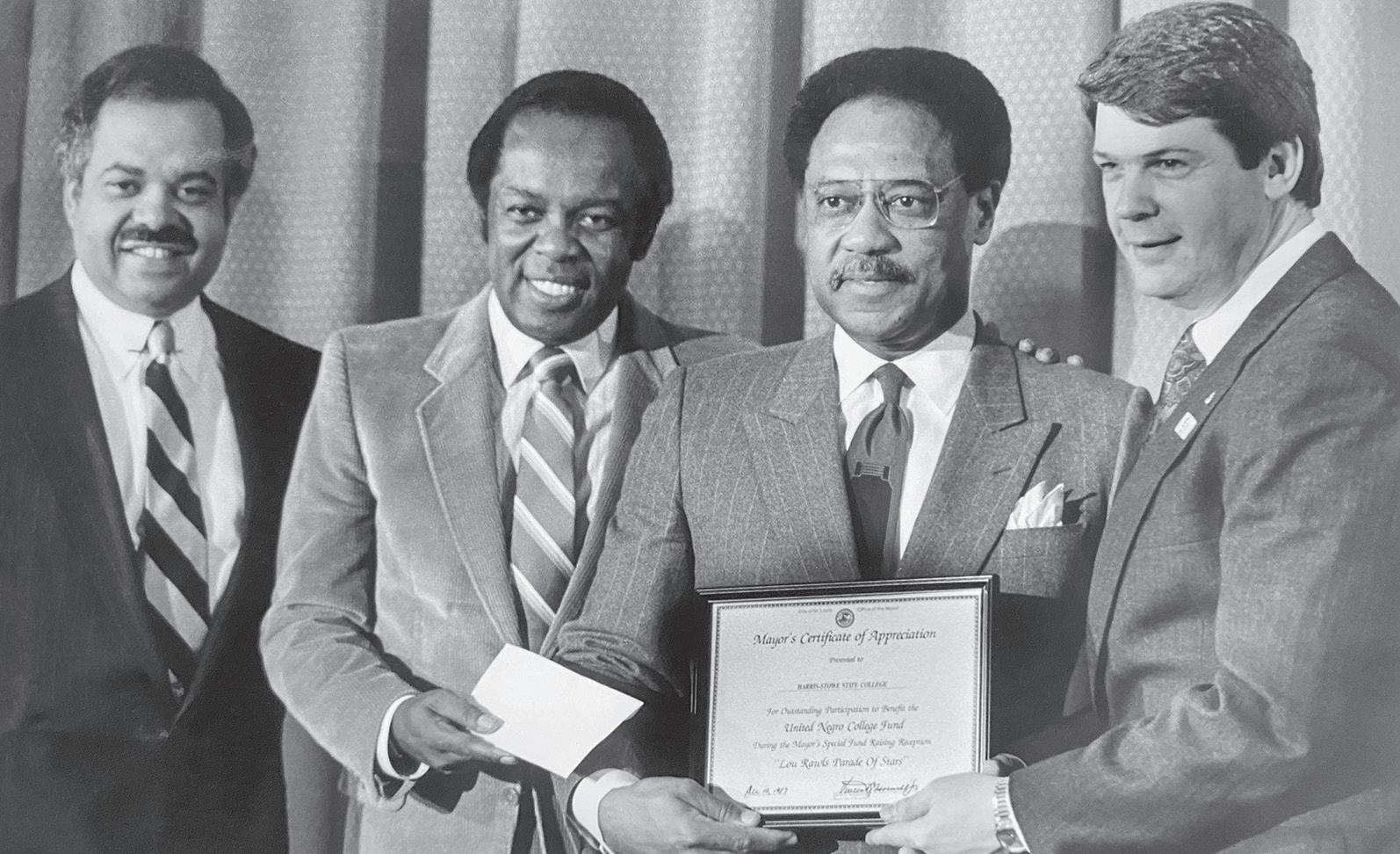



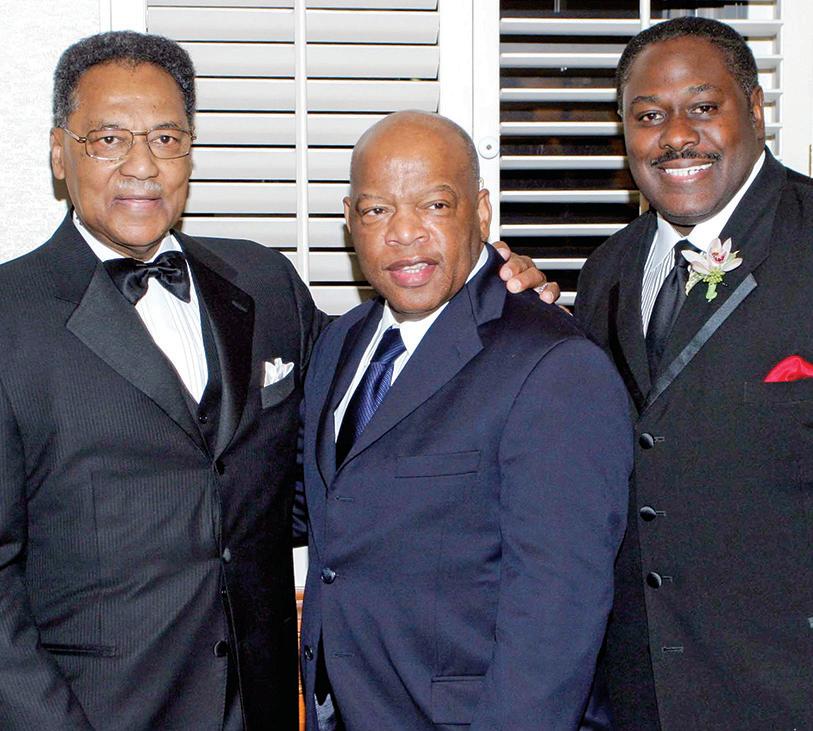
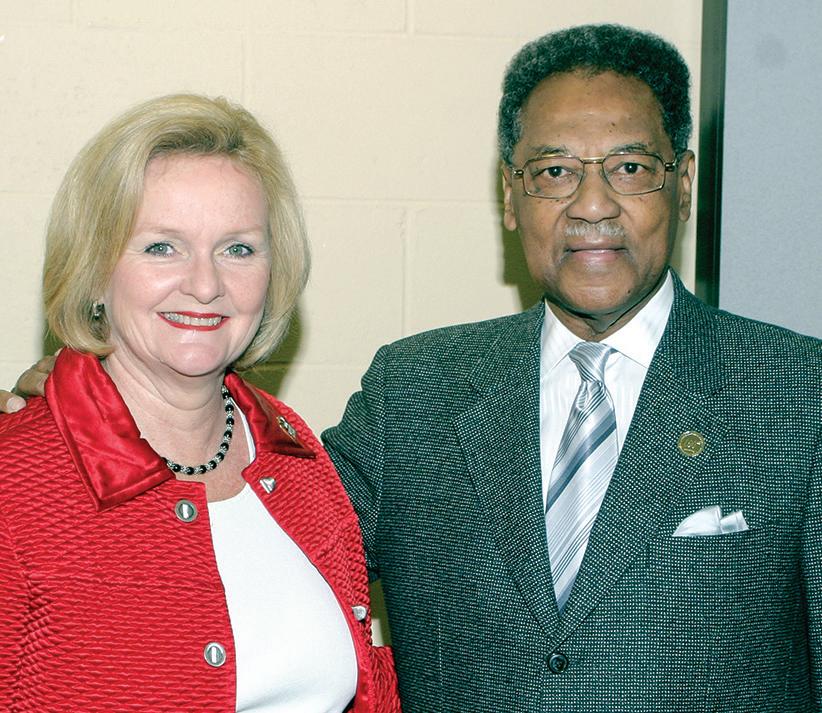



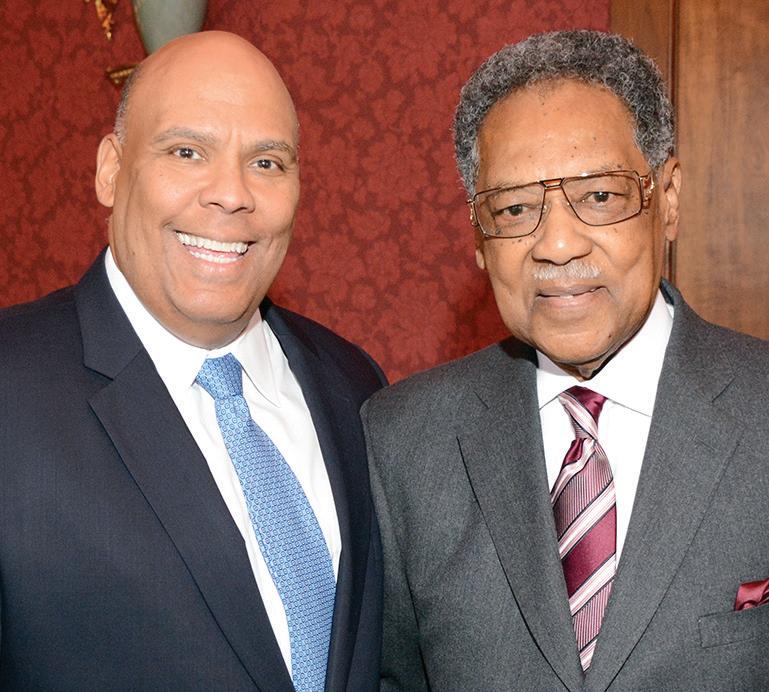

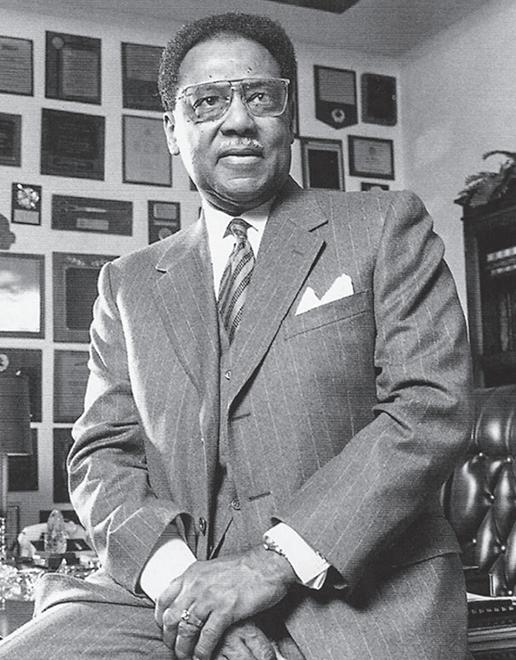


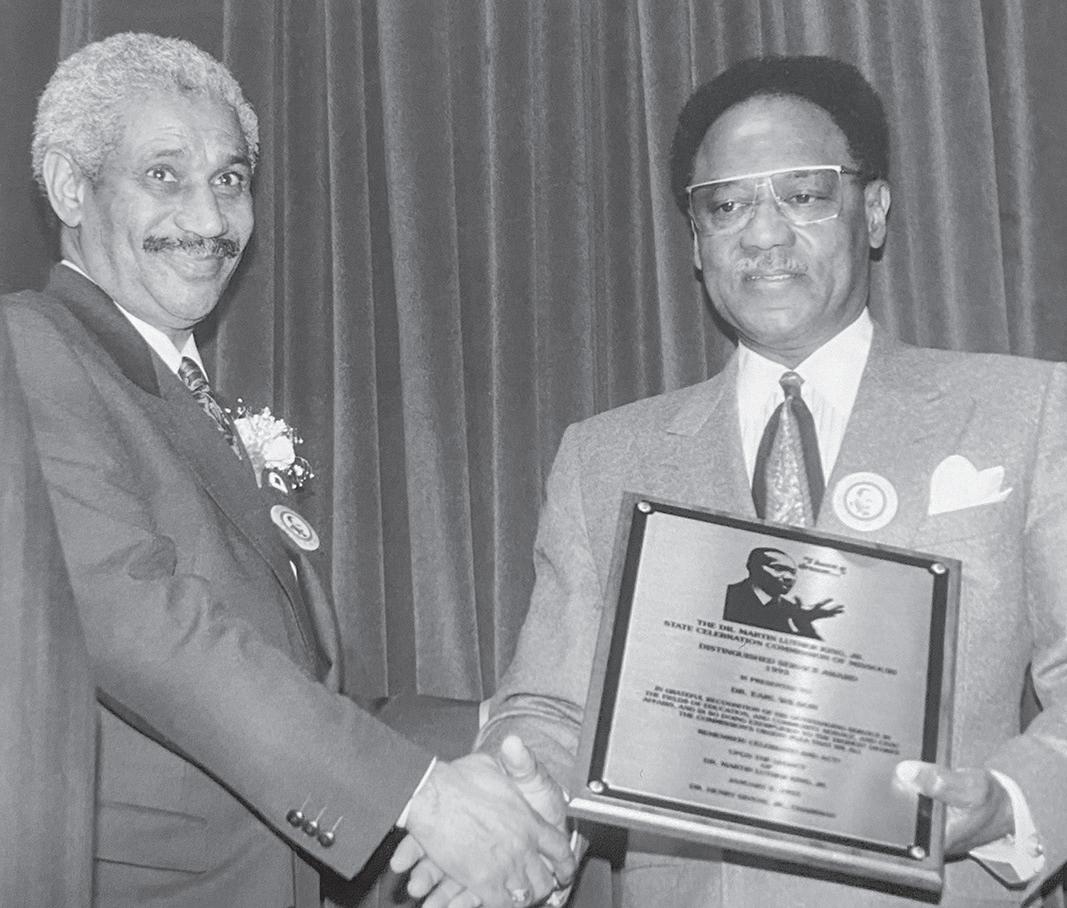


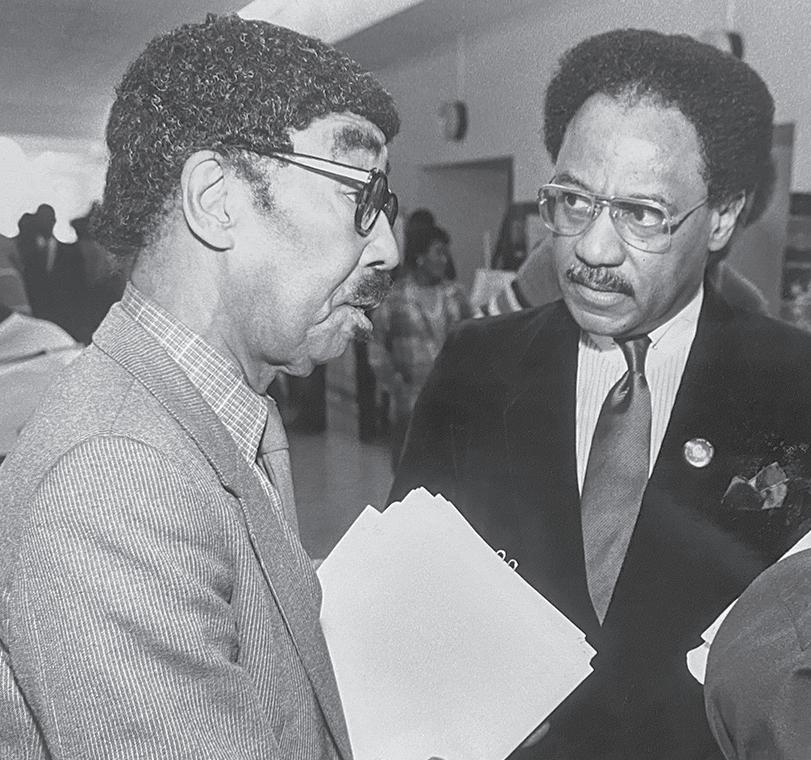
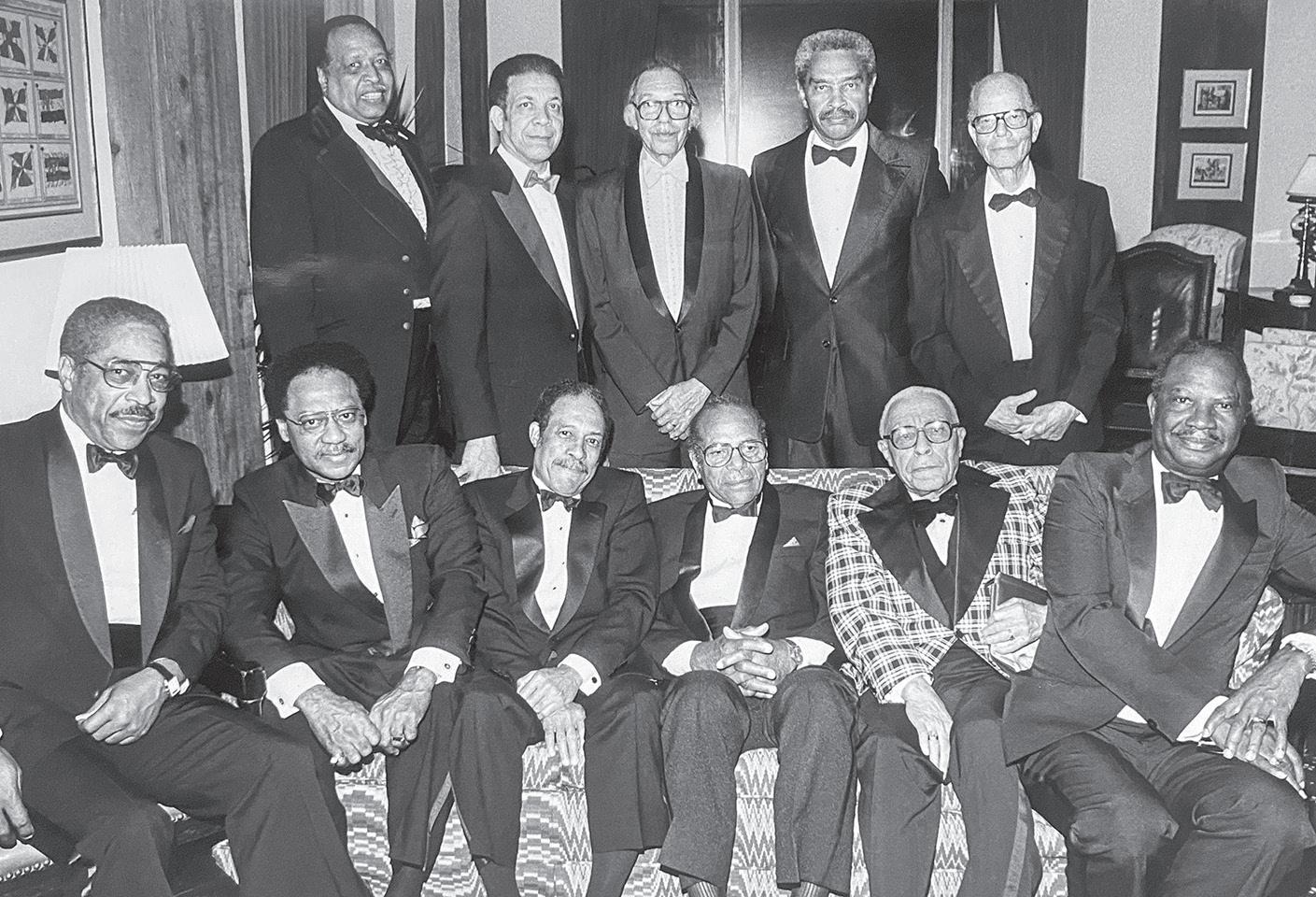
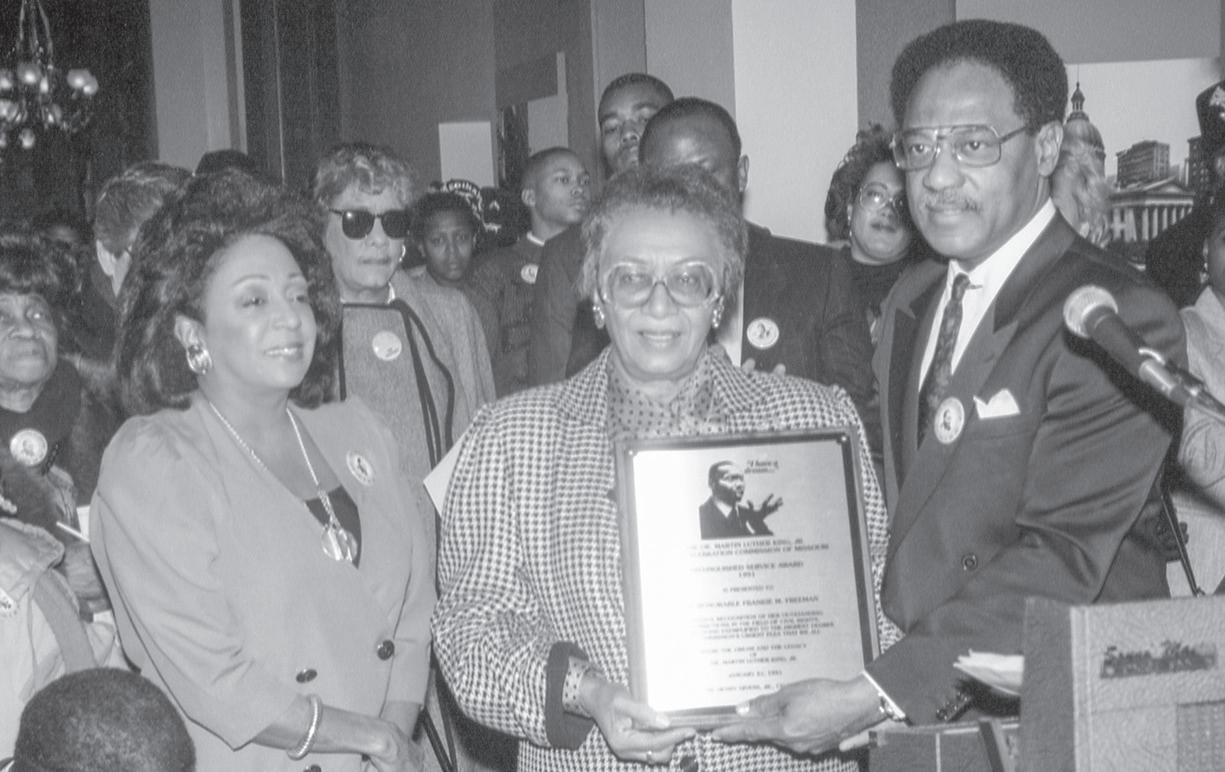



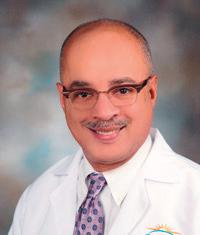



Daniel Mamah, MD, MPE Associate Professor of Psychiatry, Washington University Director, Washington Early Recognition Center
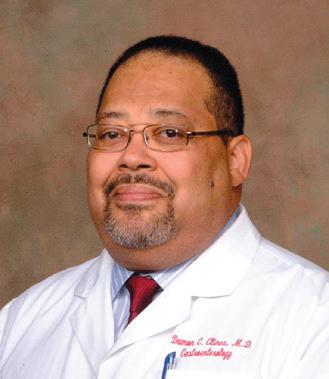

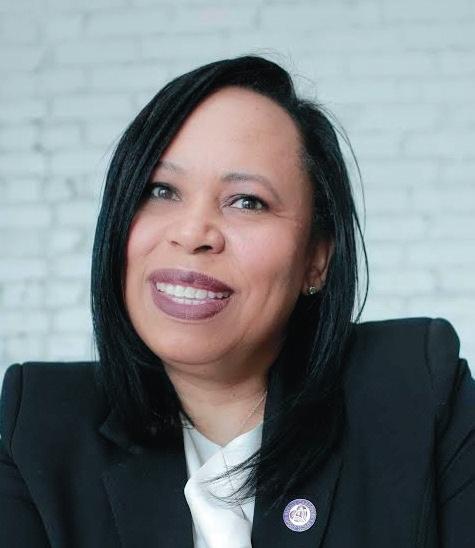



and pinot noir next year. Her brother,
Bartholomeo recipient of STEM award

Dorian Bartholomeo of the Booz Allen Hamilton St. Louis office was selected for the Women of Color STEM Technology Rising Star Award. This award recognizes those with less than 15 years experience in the workforce who are shaping future technology. Bartholomeo is a data scientist whose current projects involve creating, testing and validating algorithms to identify water on the surface of the Earth and building a predictive model to identify ecological, climate and cultural conditions that may lead to pandemics.
Dr. Williams named ABCA doctor of
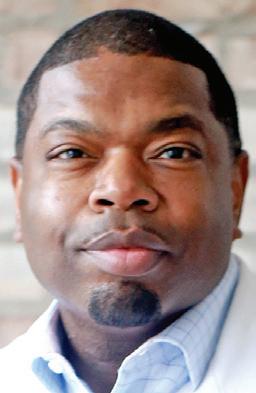
Logan University would like to congratulate alumnus and former trustee Rodney Williams, DC (’00), FICC, who received the American Black Chiropractic Association (ABCA) Doctor of the Year Award during the 40th ABCA National Convention in June. In addition to providing care to patients, Dr. Williams has dedicated his career to improving diversity and inclusion within the chiropractic profession, mentoring and guiding the next generation of chiropractors, and advocating for and educating the public on the benefits of chiropractic care. In early 2020, Dr. Williams was the first African American to be honored by the International College of Chiropractors as a fellow.
By Alvin A. Reid
The St. Louis American
Kimberly Spratt can attest that a glass of wine can change your life.
A native of Atlanta who later moved to Jackson, Tennessee, Spratt attended Vanderbilt University in Nashville and majored in French.
In 2008, while studying abroad in southern France, she met a woman named Madame Villa. Spratt’s introduction to fine wines came with that relationship – and a career path was in the works.
“She loved interacting with people. Her children and grandchildren were grown. We often had dinner together. She would bring a bottle of red wine every night,” Spratt said.
n “I always wanted to be an entrepreneur. I decided to turn passion into profit.”
– Kimberly Spratt
She offered Spratt her first glass of wine, and Spratt remembers distinctly that it was “a classic French red.”
Throughout her journey in southern France, and as her education continued, “She kind of fell in love with wine.”
“I learned the history of it, the correct way to drink it. I have continued to grow my love for wine,” she said.
She also traveled throughout France and Europe learning how wine is produced. Upon her return to the U.S., she brought “a newfound love and a desire to share that love with others.”
Spratt’s romance with wine led her to create Della W. Wines. She and her husband, St. Louis native Willie Spratt, hosted a launch party and wine tasting July 10 at the Ritz-Carlton in Clayton.
“I always wanted to be an entrepreneur. I decided to turn passion into profit. That is what prompted me,” she said.
“I think I can be a major contributor to the American wine industry.”
Spratt’s label produces a respective 2019 sauvignon blanc and 2019 rose`, which were served at the launch party that drew dozens of wine enthusiasts. Both sell for $32.95 for a 750 ml bottle.
By Karen Robinson-Jacobs
The St. Louis American
n Many Republicanled states have axed unemployment benefits enacted to help Americans facing financial uncertainty during the coronavirus pandemic.
the problems holding back women in the workplace, including women of color. He also used a roundtable discussion in St. Louis to take a swipe at those, including some Republican governors, who blame extra unemployment dollars for keeping women at home.
“What I didn’t realize in the beginning [of the coronavirus pandemic] was that 4 million women were going to leave the workforce,” said Walsh, former Boston mayor and the only man on an eight-member panel convened at Rung for Women, a local nonprofit that offers programs and services for women who “want to earn more money and elevate their lives.”
“...these women left the workforce for various reasons. Many of those reasons were child care,” and the need to care for an older adult.
“They didn’t leave the workforce because they got an See WALSH, A12

U.S.

Leathers named middle school principal

Alicia Leathers, an UMSL College of Education graduate, will be the new middle school principal at Lift for Life Academy this school year. She previously worked at Jennings Senior High School and College Prep Academy as a college advisor with the Missouri College Advising Corps (MCAC) and as a literature teacher at Central Visual and Performing Arts High School.


By Dana Rieck The St. Louis American
The St. Louis Board of Estimate and Apportionment on July 15 failed to approve the Board of Aldermen’s $168 million pandemic aid package as a contentious debate raged on over whether a portion of the bill meets federal guidelines.
St. Louis Aldermanic President Lewis Reed called for a vote on the bill during the meeting, but neither St. Louis Mayor Tishaura Jones nor St. Louis Comptroller Darlene Green seconded the motion. So instead of voting on it, the board — mainly Reed — spent almost an hour debating the legality of one portion of the bill which would dedicate money to economic development in the northern part of the city.
The failure to approve the bill came after a 12-hour meeting July 13 in which the Board of Aldermen hammered out the details and gave preliminary approval of the bill outlining how the city is to spend a portion of the first installment of $249 million out of $498 million in federal money the city will receive in the next two years as a result of the American Rescue Plan Act.
On Friday morning, in the last Board of Aldermen meeting before the two-month summer break, Reed put the bill on the informal calendar meaning the board could not amend it or take additional action Friday.
The bill includes Jones’ original plan to spend the first $80 million in federal relief money in addition to several other addons from various aldermen — including $5 million for police overtime pay, essentially undoing Jones’ decision to cut 98 vacant police positions and reallocate the $4 million in the city’s budget for those positions to other depart-
Continued from A11
The sauvignon blanc is fermented in oak and steel barrels and is described as “light and fruit forward with a smooth finish.”
The rose` is a “unique blend of Tempranillo and Movado grapes “and “has a neat and clean finish with a touch of sweetness.”
Her wines are produced from “prestigious vineyards across California’s historic world-famous Napa region and surrounding areas,” according to the Della W. website.
“Carefully cultivated and selected from the finest grapes, these proprietary wines have fresh, bold flavors.”
Continued from A11
extra $300,” he said.
Many Republican-led states have axed unemployment benefits enacted to help Americans facing financial uncertainty during the coronavirus pandemic.
In May, Gov. Mike Parson directed the Missouri Department of Labor and Industrial Relations to end

ments.
This spending plan includes money to help residents cover rent and mortgage payments, utility bills and home repairs while also funding things such as vaccination efforts, neighborhood violence prevention programs and outreach work with the unhoused. In addition to that aid, there is money allocated for $500 one-time cash payments to approximately 10,000 residents affected by the pandemic.
The approval of both the Board of Aldermen and Board of Estimate and Apportionment are required for the measure to become law and for the funds to be used by the city.
Jones released a memo from interim city counselor Matt Moak, who, in conjunction with auditor Rubin Brown, asserted that $33 million of provisions in the bill for economic development fall outside of federal regulations for spending American Rescue Plan Act funds.
“The idea that we would legislate something that on its face does not appear to meet its guidelines — I think that’s bad practice,” Moak said during Friday’s Board of Estimate and Apportionment meeting.
Reed argued the bill is allocating the money to the region hit hardest by the pandemic (North St. Louis) and it would be up to Jones’ administration to follow federal law. Jones
Next year, Spratt said, Della W. plans to add a chardonnay and pinot noir to her label.
While all sales are now online, Spratt is already working toward getting her label into retail and liquor establishments, and bars and restaurants.
“We are starting online to build local support,” she said.
“We will eventually have tastings, and Della W. wants to be involved in the community.”
Della W. will host events in October in recognition of Breast Cancer Awareness month, and the business is already making a difference.
“With our wine box sales, 5% of proceeds will go to breast cancer awareness and research,” Spratt said.
The company’s goal is to raise $10,000 for that cause.
The premium wine box sets,
participation in all federal pandemic-related unemployment insurance programs effective June 12. The move was said to be aimed at addressing workforce shortages across the state.
But Walsh, who was accompanied by St. Louis Mayor Tishaura Jones, joined others on the panel who pointed to structural barriers – including child care – that are keeping women sidelined.
Noting that nearly two million women still have not returned to the workforce even

wants the bill amended so that the spending, without a doubt, falls within federal regulations.
If the city does spend the money outside of federal stipulations it will be responsible for paying back those funds.
“People are suffering, this should have been very easy. This should have been a five-minute meeting,” Reed said at the Board of Estimate and Apportionment meeting. Jones attempted to introduce an amendment in Friday’s meeting to remedy the language of the provisions in question but she was met with opposition from Reed — opposition marked by interruptions and a resistance to letting the Mayor speak throughout the meeting.
“Comptroller Green and I agreed that as fiscal stewards of our city, we cannot approve legislation that goes against U.S. Treasury rules and could force St. Louis to pay back millions of dollars in funds,” Jones wrote Friday afternoon. Green added in her own statement that this “kind of brinkmanship” is a pattern of behavior for Reed.
“Reed’s unwillingness to address his bill’s fundamental flaws—despite multiple attempts to work with him— has now stalled the relief our residents and businesses so desperately need,” Green wrote. “Instead of making positive strides towards working together, Reed’s actions not only churned division among elected leaders, but lacked real leadership and could ruin a golden opportunity for relief for the people of St. Louis.”
It is possible that the Board of Aldermen will be called into special session during their two-month summer break to take action on the bill.
which cost $59.95, come with a bottle of wine and four topgrade accessories.
Spratt explains on the Della W. website that “it has always been important for me to remember my roots and all the people who have poured into me and my dreams.”
“I’m named after a family member who was influential in my own mother’s life. I created Della W., a variation of my name, to continue the tradition of influence and inspiration. I dedicate my dream to all the strong, resilient, loving and supportive women in my life.
“To the Caudles, Crawleys, Warrens and Rices – I am who I am because of you.” For purchases and additional information, go to www.dellawwines.com.
as some industries have begun to rebound.
“We should spend less time talking about the extra benefit from employment and more time talking about how do we make sure we [promote efforts] to help women return to the workforce,” Walsh said.
A primary vehicle, Walsh said, will be Biden’s $3.4 trillion investment in people.
“Job training is in that bill, workforce development, apprenticeships, clean energy, and ...childcare. Universal pre-kindergarten is in that bill.”
Democratic senators said they reached a deal on a $3 trillion-plus infrastructure bill, according to media reports. The measure includes Biden’s “human” infrastructure priorities, including child care, health care and education, not covered by a smaller bipartisan proposal.
Walsh was in St. Louis to meet with Jones, workers, union and business leaders.
Jones said she and Walsh “discussed the importance of empowering women with good jobs and the necessity of federal infrastructure funding in helping our city build back better.”
Karen Robinson-Jacobs is The St. Louis American / Type Investigations business reporter and a Report for America corps member.
By Earl Austin Jr.
The St. Louis American
It was a trying year as the COVID-19 pandemic raged across the St. Louis metro area. Despite working against tremendous odds, high school sports seasons in the area were completed – and they offered plenty of excitement.

Here is a recap of a great season in the St. Louis American Prep Year in Review.
V, Get Ready to Roll:
The Vashon Wolverines concluded a dominating boys’ basketball season by winning the Class 4 state championship, which is the 12th in the school’s storied history. The Wolverines defeated Westminster Christian to win the title in Springfield. They were led by Division I recruits Nick Kern (VCU), Keshon Gilbert (UNLV) and experienced senior guards Reco Bailey and Tre’von Love.
A Ritter Repeat: After winning the Class 3 state basketball championship last season, the Cardinal Ritter Lions were bumped up to Class 5. All the Lions did was repeat as state champions, only in the bigger class. The Lions staged a series of dramatic late-game comebacks to take the state title. Ritter had late victories over University City and DeSmet in the playoffs, but
the biggest rally came in the state semifinals. Ritter came back from 17 points down to defeat Van Horn in double overtime. The Lions completed the championship repeat with a victory over Bolivar.
Incarnate is the Word: The biggest dynasty in Missouri girls’ basketball added another chapter in 2021 as the Red Knights won the Class 6 state championship. After dominating the Class 4 landscape for the past several years, the Red Knights were bumped up to Class 6. The result was the same as IWA completed a 29-0 season with a victory over Webster Groves to win the state title. The Red Knights were led by stellar point guard Saniah Tyler and talented Natalie Potts.
Whitfield Makes (Her) story: The Whitfield girls have been knocking on the door of a state championship for the past five years with several trips to the Final Four. This season, the Warriors broke through by defeating West Plains to win the Class 5 state championship, which is the first in girls’ basketball in school history. The Warriors were led by senior guard Kelsey Blakemore and a talented group of young players.
STEAM Academy heats up track: The school’s name changed, but state championship success still comes to STEAM Academy at McCluer South-Berkeley. The Bulldogs won the Class 2 state championship in convincing fashion with twin

out in
Vashon forward Arlandus Harris hammered home a slam dunk during the Wolverines’ Class 4 basketball state championship victory over Westminster Christian on March 20 in Springfield.
athletic memory by winning the Class 4 state championship in the last event in the school’s history. The Titans became back-to-back state champions as they won the Class 3 state title in 2019 as well. They were led by state championship performers Sydney Juszczyk in the javelin and Brooke Moore in the triple jump.
Ritter girls dominate the track: Cardinal Ritter was bumped up to Class 5 and all the Lions did was win the school’s first state championship in girls track in convincing fashion. Not only did Ritter win the state title, but it also won with a talented group of freshmen athletes that are poised for a tremendous run in the future. The leader of the pack this spring was freshman sprinter Aniyah Brown, who won state titles in the 100- and 200-meter dashes.
style: Trinity Catholic closed its doors at the end of the school year, but the girls’ track and field team provided a final
Mascoutah rules the track: The Indians won the IHSA Class 2 state championship in boys’ track and field. It was the school’s first state championship in any sport since the football team won in 1979. The Indians got a big boost from outstanding senior thrower Barry Evans, who won the state title in the discus. Althoff girls win their first: The Crusaders made history in girls’ track and field this spring when they won the IHSA Class 1A state championship, the first in the school’s history. The Crusaders were led by senior standout Nariah Parks and a supporting cast of young talented athletes.
First-year Tennessee State University head coach Eddie George was a guest on ESPN’s “First Take” last week as the show starring Stephen A. Smith, Max Kellerman and Molly Qerim Rose would broadcast live from Memphis on Sept. 10. George’s TSU squad will take on Deion Sander’s Jackson State Tigers in the Southern Heritage Classic on Sept. 11. George said he has a vision of HBCU football growing into a commodity that attracts national TV audiences and huge crowds.
Gateway Classic was part of the local football schedule.

“[I’m] talking about [former Grambling head coach and college football Hall of Fame member] Eddie Robinson and some of the great coaches in HBCU history and 70,000 fans being in the stands,” he said.
“It’s a wonderful opportunity for us to highlight the programs and highlight the universities and what they’re known for.” George believes that “classic” games pitting HBCU football teams in American cities are key to future success.
St. Louis should not wait until the fourth quarter to attract one of these games. It has not been that long since the
The late Earl Wilson and his Gateway Classic Foundation were instrumental in presenting the game. More than 20 were held, with early contests at Busch Stadium. The Classic then moved to the Edward Jones Dome. Now called the Dome at America’s Center, it still has the football field and hosted the 2019 St. Louis Heritage Classic between Kentucky State University and Lincoln University. The venue’s size remains a problem. If George’s vision comes to fruition, it would not be impossible to draw 60,000. That day isn’t here yet. The 22,500 seat St. Louis City Stadium, which will be home to the MLS expansion franchise beginning in 2023, is taking shape in the Downtown West neighborhood near Union Station. But its design is soccer specific. However, when it comes to sports and the revenue major events can bring to downtown St. Louis, one should never say never.
Attracting a Jackson State, Grambling, Tennessee State
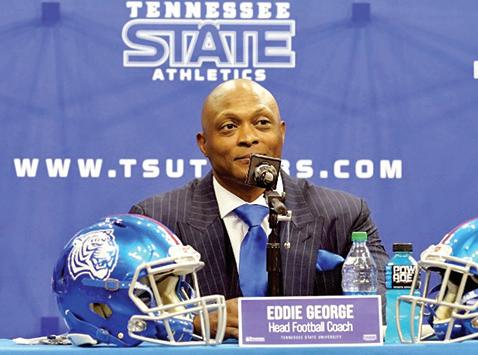
or other national, high-profile HBCU program is going to take money. It is just a fact.
Corporate St. Louis and the St. Louis Sports Commission would have to find the dollars needed to pull this off. ESPN or a regional television network (Bally’s) would probably have to be involved.
This type of event has most likely surpassed what a notfor-profit organization like Wilson’s Gateway Classic uniquely crafted for decades. There is a new revenue generator that could put
money directly into the hands of HBCU players who come to St. Louis to participate in a contest.
College athletes can now be paid for use of their respective, Name in Likeness (NIL), and this certainly includes HBCU players.
247 Sports recruiting analyst Chris Hummer recently told HBCUSports.com, “I see no reason why local restaurants, local barbershops, local bars wouldn’t want to work with athletes that have some level of grassroots sway within their
First year Tennessee State football coach
Eddie George has joined Jackson State’s Deion Sanders as former NFL greats that now lead HBCU programs. George told ESPN that games like the Sept. 11 Southern Heritage Classic in Memphis between those schools will help HBCU schools draw national attention.
community.” The new NIL regulations became part of the NCAA bylaws July 1. At midnight, Jackson State defensive end Antwan Owens became the nation’s first athlete to sign an NIL deal. He will earn $5,000 to endorse Three Kings Grooming, a Blackowned hair product shop. Four of his teammates are also signing deals with the shop.
The Reid Roundup
The Dallas Cowboys are among the NFL teams that failed to reach an 85% player vaccination rate. Michael Irvin is infuriated. “[N] ot being one of the [85% vaccinated teams] says there’s other things to a great number of people on this team that are more important than winning championships, and that makes me worried.”...Bradley Beal will miss the Tokyo Olympics because of COVID-19 protocols. It is unclear if Beal contracted the
or if he has been vaccinated. Why he hasn’t said what the
is, is beyond me…Lewis Hamilton was penalized for an incident that drove rival Max Verstappen into a tire barrier shortly after the start of the July 18 English Grand Prix. He was given a 10-second pit stop penalty but rallied to take the lead with three laps remaining and captured the checkered flag.


Larry Bonds loses his life to COVID-19
By Sylvester Brown Jr.
The St. Louis American
“I just knew he was gonna be OK. He was the miracle man,” Marsha Bonds sadly recalled the day she learned that her husband of 40 years, Larry D. Bonds, was diagnosed with the coronavirus.
Marsha tested positive first, on June 3. The next day, her spouse learned that he was also infected.
“Well, it’s you and me babe,” she said, recalling her husband’s words and upbeat attitude.

Both were confident they’d beat the virus. The couple had been vaccinated. Marsha Bonds likened her symptoms to a bad cold. Mostly, though, she just knew her husband would pull through. In the early 2000s, he suffered from heart failure. For six months, while waiting for a donor heart, he survived with the help of a left ventricle assist device (LVAD), a

mechanical device that pumps blood to the aorta and throughout the body.
On Nov. 18, 2008, a heart became available from a donor, Tommy Quertermous, 37, who was killed in a farming accident. The operation was scheduled the next day, Nov. 19. It was Larry and Marsha’s middle child
By Benjamin Chavis Jr. Guest Columnist
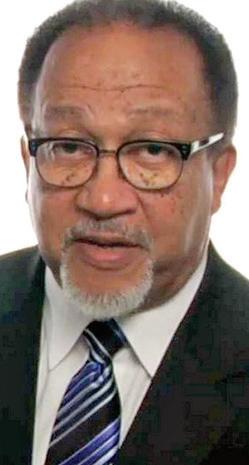
In the past year, a reckoning has happened across the country. What Black people and other communities of color have known for years, our white brothers and sisters are starting to learn. Our country is plagued with systemic racism that runs through industries across the nation. Most concerning is the deep roots it has within the American health care system. It’s time that we shine a light on this and stop letting insurance companies get away with it. Health insurance companies have a long-proven pattern of exploiting and discriminating against people of color in this country, as I wrote in an op-ed in The Hill in April 2020.
“Minority and low-income Americans suffer from a significant lack of access to quality health care. They are also more likely to not have health insurance and are often hit with surprise medical bills they cannot afford,” I wrote.
n Health insurance companies have a long-proven pattern of exploiting and discriminating against people of color in this country.
Now, insurance companies are at it again by prioritizing their own profits rather than the health and well-being of all Americans.
One of the most recent acts of insurance company greed happened with UnitedHealthcare, the nation’s largest insurance provider. Just recently, the insurance giant announced it would no longer cover patients’ nonurgent visits to the emergency room retroactively. Yes, you read that correctly. An American insurance company is no longer going to cover American patients who incorrectly selfdiagnose and seek emergency treatment. With a year of one public health crisis after another, UnitedHealthcare is creating an extra barrier to entry for patients accessing care. As
See CHAVIS, A15
By JoAnn Weaver
The St. Louis American
The number of coronavirus cases in St. Louis on Tuesday was 38% higher than a week earlier and Black residents comprise 80 percent of new coronavirus cases since May.
St. Louis County has also experienced a dramatic increase in the average number of new cases per day. As of Tuesday, 170 new cases were being reported daily, 34%higher than just a week ago.
“Additionally, we have seen our regional positivity rate grow to around 10%, and we are aware that the ‘hot spot’ in southwest Missouri is moving northeast toward our region,” the St. Louis County Department of Public Health (DPH) and the City of St. Louis Department of Health (DOH) wrote in a joint statement released Tuesday.
n The number of coronavirus cases in the city of St. Louis on Tuesday was 38% higher than a week earlier and Black residents comprise 80% of new coronavirus cases since May.
“We are very concerned with these numbers and are actively studying further steps.” Mandatory indoor mask wearing was not ordered, and “for the moment, we will continue to urge everyone to wear masks, even if you are vaccinated.” “Vaccination remains the best protection
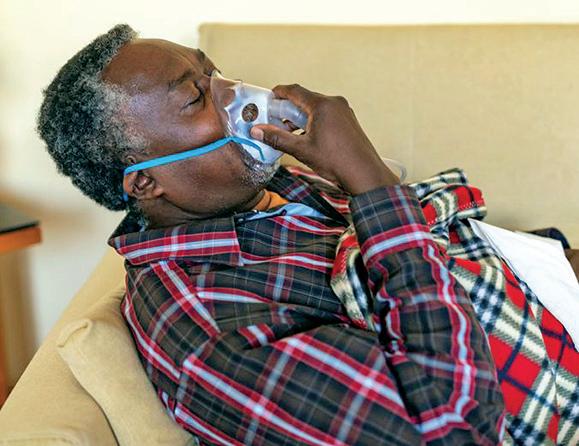
New coronavirus cases have jumped dramatically in St. Louis and St. Louis County during the last week and Black residents in the city comprise 80% of new cases. This comes as a ‘hot spot’ continues to move from southwest Missouri toward the St. Louis area.


By JoAnn Weaver
The St. Louis American
More than 39% of Black children in Missouri are impoverished, which leads to more health problems and lack of health care access, according to a study by the United Health Foundation.
The UHF Health Disparities Report, which highlights disparities in race and ethnicity, education, gender and geography shows that 39.1% of Black children here live in poverty. This is substantially higher than the 32.5% national average.
Just 14.8% of white children in Missouri live in poverty, and the rate for Black children is also higher than other ethnic groups.
“High school graduation and child poverty are big issues right now in Missouri,” said Dr. Georges Benjamin, executive director of the American Public Health Association.
“When these issues are addressed, it will improve the health of the community as well as drive the economy.” Benjamin said those social determinants give insight into what needs to be fixed to improve overall community health.
“Aside from this, we now know that tragically during COVID-19, lots of people lost their lives, and it was disproportionately African American women,” Benjamin said.
Continued from A14
against COVID-19, and the City and County urge you to get vaccinated immediately if you have not done so, and have your family members 12 and older do the same.” The startling news comes as St. Louis County’s 2021 Back-to-School Immunization Program, took place at the John C. Murphy Health Center on Monday, July 19.
“More and more young people are getting vaccinated but it’s not happening fast enough,” St. Louis County Executive Dr. Sam Page said. This year, the COVID-19 vaccine will be available to
Continued from A14
Marlin’s birthday.
“Larry died three times that day,” Marsha Bonds said, recalling the number of times her husband had “flat-lined” and had to be resuscitated before and during the operation. Hospital officials called the family, saying that he wasn’t expected to survive.
Marsha nicknamed Larry “miracle man” because he did survive and came home with a new heart and an increased passion for the sanctity of life.
The report demonstrated persistent and growing disparities in maternal mortality. From 2015 to 2019, Black mothers (43.8 deaths per 100,000 live births) had a maternal mortality rate that was 3.4 times higher than Hispanic mothers (12.7 deaths per 100,000 live births).
“This is one of the national tragedies we continue to see growth in, African American mothers in particular are dying either in or shortly after pregnancy,” Benjamin said. Between 2005-2009 and 2015-2019, maternal mortality rates increased 22% among Black mothers, from 35.8 to 43.8 deaths per 100,000 live births, according to the United Health Foundation report.
“The exact root cause for this is currently unclear, but causes for the maternal mortality lie in post-partum hemorrhages and post-partum infections,” Benjamin said.
“There is a national effort to try to better understand why it happens,” Benjamin said. “I can tell you that stress plays a role in this, particularly with eclampsia and pre-eclampsia.”
Preeclampsia is a pregnancy complication characterized by high blood pressure and signs of damage to another organ system. Eclampsia is a severe complication of preeclampsia. It’s a rare but serious condition, In which high blood pressure results in seizures during pregnancy.
“It can be devastating for
students 12 years and older as part of the back-to-school program. The shot also will be available for free to parents and guardians.
“It’s up to the schools to determine effective policies to keep children safe this school year,” Page said. “As we see cases rise, we hope they will make the right decisions to protect school-aged kids.” When asked what the St. Louis County Department of Public Health would do if COVID-19 cases continue to rise while school districts enforce pandemic policies, Page said that the government had limited power.
“We have a great partnership with County schools,” Page said.
“We have regular meet-
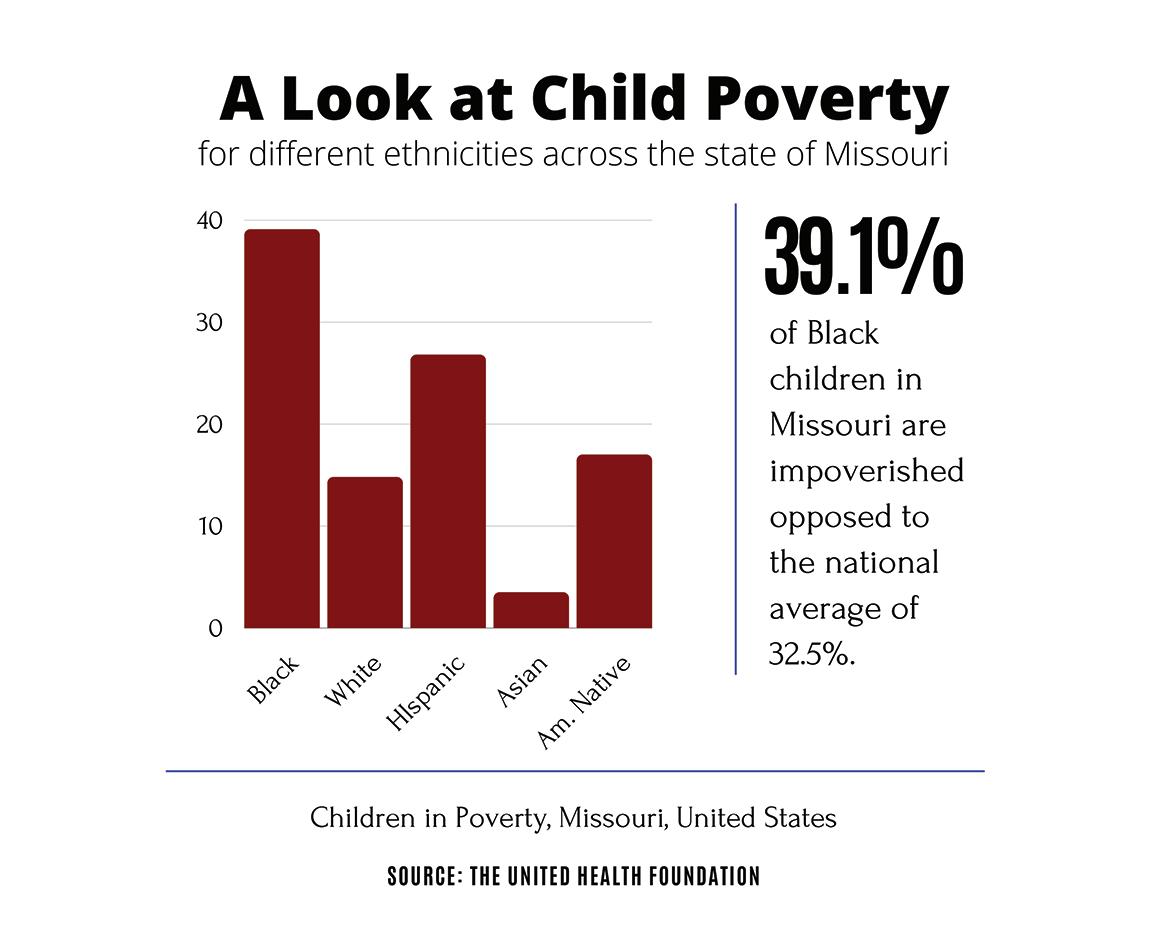
both the mother and the baby; it continues to be a challenge for women of color,” Benjamin said.
According to Benjamin, all moms should have access to quality health care throughout their pregnancy.
“For mothers who are on Medicaid, we need to make sure that their coverage doesn’t
ings with superintendents and their leadership. I think these conversations will continue as we move closer to the fall. If COVID-19 cases do not turn around, I would expect the schools to look closely at their policies, evaluate them and go from there.”
Right now, public health orders are not on the table.
“We are currently pulling out all the stops to get people vaccinated as quickly as possible,” Page said.
COVID-19 vaccinations are available at the North Central Community Health Center located in Pine Lawn and the South County Health Center.
Ronald K. Finnan, County Health Department COO, said “The important thing to remember is that we look at the
terminate after they deliver the child so they can have the adequate postnatal care they need,” Benjamin said. “This is one of the policy solutions that’s being looked at currently at the national level.”
Other health issues discussed in the report include adequate nutrition, tobacco use reduction and substance abuse
increase in COVID not only are we promoting vaccines here, but we are also having a concerted effort on the back-toschool immunization.”
Many students were not immunized or vaccinated last year because of the quarantine and so the push this year is to catch those kids up and get those vaccines and immunizations done.
Additionally, the Sleeves Up STL initiative has also started.. The goal of the initiative is to encourage African Americans to get vaccinated by partnering with barber shops in St. Louis County. At least half of Black men in St. Louis County have not been vaccinated yet, according to the Department of Public Health Research.
in pregnant women.
“The infant mortality rate in the Black community has been going down over the years, but the disparity has remained between African American babies and white babies.”
Socioeconomic inequality in the United States is likely a primary contributor to its higher infant mortality rate.
The kick-off event took place on July 19, at the Ultimate Cosmetology and Barber Academy. The initiative provided posters, flyers, masks and other material that shop owners can use to share information about getting the COVID-19 vaccine.
“We’re targeting barbershops because that is a pillar of the community where guys go to talk about everything from sports to politics,” said Damon Broadus, director of Health Promotion and Public Health Research for the County Health Department.
Black men under the age of 50 in zip codes: 63033, 63031, 63136, 63114, 63121, and 63135, make up the largest proportion of unvaccinated individuals in St. Louis
“In the places they have been able to address this aggressively, they make sure the parents are healthy before conception,” Benjamin said.
“Early identification of any problems and getting referred to a specialist is important especially for a high-risk birth, which can include twins.” Benjamin said a national goal should be “to make sure everyone has affordable health insurance.”
“I think in addition to this, policymakers can look at the disparity report and evaluate what is working and what can be improved for each state, like Missouri.” There was good news on the employment front before the pandemic struck Missouri and the nation.
There was a 40% unemployment reduction in the Black population between 2005-2009 and 2015-2019. It dropped from 13.9% to 8.3%, nationally.
“These numbers are pre-pandemic, when the nation was on an upsurge,” Benjamin said.
“There was the Obama economy where we saw a financial increase in the nation’s prosperity, which continued during the Trump administration.”
Other studies concluded that low levels of unemployment in the country also benefited people of color, particularly African Americans.
County. “We are asking barbershop owners to serve as health ambassadors and talk about the benefits of getting the vaccine while dispelling myths and any misinformation people may have heard,” Broadus said.
Shop owners who participate in the program may be eligible for financial compensation.
According to Page, this initiative is a great way to get information as well as clear up any miscommunication in the community.
“We are laser focused on getting everyone vaccinated so we won’t have to impose restrictions on St. Louis residents,” Page said.
Already an ordained minister at Abundant Life Fellowship Church in Florissant, Bonds started preaching the gospel of organ and tissue donations. As a Mid-America Transplant Services (MTS) volunteer, he made it his personal mission to reach out to people, especially Black people, to convince them to donate their organs to save the lives of others.
Continued from A14
pointed out by the American College of Emergency Physicians, there is a fear that “the change will cause patients to avoid using emergency rooms because they will be responsible for their hospital bills when UnitedHealthcare rejects them.” Because many
He also founded a nonprofit organization, the Larry D. Bonds Foundation 4 Life in 2012. He wanted the agency, Marsha explained, to serve as a liaison, advocate and mentor that would provide physical and emotional support for preand-post-transplant recipients and donor families. The foundation established the Tom Quertermous Memorial Apartment to house families of organ recipients
patients were already fearful of visiting the hospital during the COVID-19, there was a rise in cases of “outof-hospital cardiac arrest and associated poor health outcomes,” as reported in Health Affairs by researchers from the M.I.T. Sloan School of Management and unsurprisingly, this rise was particularly seen in lowincome neighborhoods. As with most corporate
during medical treatments. In 2016, Larry created the “Two Men & One Heart” scholarship fund which awarded $500 scholarships each year in the names of his donor’s daughters, Logan and Jaycie Quertermous.
Marsha Bonds and the “miracle man” were planning to celebrate their 40th wedding anniversary June 6. Unlike their humble 1981 wedding in her parent’s backyard, this event was to be an elegant, elaborate affair.
“Oh, we had a big party planned. It was going to be at the Norwood Hills Country Club. Everything was already paid for,” she recalled.
“We had a four-layer cake, grooms and bridesmaids. The kids were coming to town. We
decisions, the effects of this policy will inevitably affect our nation’s most vulnerable populations the most. In fact, according to a 2017 University of Maryland School of Medicine study. Black Americans use the emergency room more often than any other racial group.
To put that simply, UnitedHealthcare’s policy is directed at those who visit emergency rooms, and Black
planned to have the wedding my parents could not afford 40 years ago.”
Although Marsha recuperated at home, Larry was hospitalized and was immediately put on a ventilator. His condition declined rapidly. His immune system was too weak to fight off the complications of COVID. Within a month’s time, Larry Bonds succumbed to the disease.
According to health professionals, a weakened immune system or other conditions such as lung disease, obesity, advanced age, diabetes and heart disease can put people at increased risk for coronavirus infection and more severe cases of COVID-19.
Marsha Bonds is still
Americans are the most likely demographic group to visit the emergency room. A coincidence? I doubt it. Patients should not be expected to correctly selfdiagnose their health issue before visiting the emergency room.
Patients look to medical professionals to diagnose and treat health problems; putting the burden back onto patients is unacceptable.
pro-vaccine, as was Larry before his death. Others in her family, Marsha said, also contracted the disease. She and they only suffered mild symptoms and survived because they were all vaccinated, she maintains. Because of his compromised immune system, however, Larry wasn’t as fortunate.
“I basically went from planning a wedding to planning a funeral,” Marsha said.
Although Larry’s body was cremated, Marsha Bonds and the couple’s three children, Nichole (Nichols), Marlin and Shannon Bonds are planning a memorial service at the end of the month to honor Larry’s life and memory. Marlin Bonds remembers the lessons his father left with him.
While the policy was scheduled to take effect on July 1, public backlash led to UnitedHealthcare’s new stance that it should not go into effect until “the end of the national public health emergency period.”
UnitedHealthcare should not get away with this.
We must speak out and advocate for those who do not have a platform to speak for themselves. Those with
“He was definitely a disciplinarian. I was the only boy, but he taught all the boys who grew up under his watch to respect women, to respect my mother, to be a man of God and always take care of each other in terms of family.” The Bonds’ youngest, Shannon, had similar recollections:
“Dad was an above and beyond type of person. He was a father to many, not just the three of us; be they relatives, nephews, anybody. He was loyal, honest and he taught us and others how to truly, genuinely love.”
Sylvester Brown Jr. is The St. Louis American’s inaugural Deaconess Fellow.
chronic conditions, from low income and minority communities deserve to seek emergency health care without fear of racial discrimination and indebting themselves or their families.
Benjamin Chavis Jr. is president and chief executive of the National Newspaper Publishers Association (NNPA) based in Washington, D.C.


By James T. Ingram
For The St. Louis American
Easily, the two most studied race massacres of the 20th Century are the Tulsa race massacre of 1921, followed closely by the East St. Louis race massacre of 1917.
To be exact, the proper terminology to describe these events are pogroms, as Penn State professor Charles Lumpkins refers to them. They were “an assault, condoned by officials, to destroy a community defined by ethnicity, race or some other social identity.”
Don’t get me wrong, I derive no pleasure in comparing travesties. However, both massacres or pogroms share
the thread of the annihilation of Black folks under false and racist pretenses in order to deprive them of their God-given right to self-determination. The recent centennial anniversary of the Tulsa massacre and destruction of what was referred to as “Black Wall Street” was well documented and thoroughly covered by many network and media outlets nationally. Yet it was barely discussed publicly for much of that century - not even by Tulsa natives. During that Memorial Day weekend of 1921, up to 300 Black Tulsa residents were murdered. Thirty-five square blocks of Black homes, churches, businesses and schools were
looted, burned and firebombed, simply because they defied the racist stereotype that “Black people are lazy” and, instead, created their own affluent reality.
And why? In this case it was a lie that a 19-year-old Black male shoeshine had assaulted a 17-year-old white female elevator operator. White racist mobs used the tale as fuel to justify the destruction of a Black community whose progress they already detested.
In the case of the July 2, 1917, East St. Louis race massacre, the powder keg was ignited when the
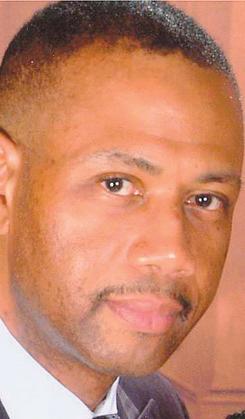
Columnist James T. Ingram
Aluminum Ore Company recruited and hired 470 Black migrant workers to replace white workers who had gone on strike. Following a city council meeting in which angry white workers lodged formal complaints against black migrant workers, racist thugs and terrorists organized lynch mobs who cowardly beat, stoned, shot and kill black workers, spilling over into the black residential community.
Over 300 Black homes were torched, with estimates as high as 200 Blacks being slaughtered; many shot
as they attempted to flee from their burning homes and some drowning in the Mississippi River as they attempted to swim across to St. Louis, MO after police shut down the Eads Bridge, which many had used to flee.
Both massacres are horrific, only exacerbated by the fact that for a century they were rarely discussed by white or Black residents of either community. Nor were they taught or discussed in Tulsa or East St. Louis public schools.
I’d love to see the same national attention given to Tulsa, given to East St. Louis and her race massacre; not out of some desperate desire for recognition, but to amplify
and document the frequency and intensity that these pogroms took place throughout American history. If there’s ever to be a true racial reckoning in America it must begin with the telling of this narrative that has, largely, been a well-kept dirty secret that must be told, unpacked and addressed. Otherwise, peace will become an elusive mirage in an America whose biggest lie is that there is “liberty and justice for all.”
Email: jtingram_1960@ yahoo.com Twitter@ JamesTIngram


Area legislators were able to get multiple bills to the governor’s desk
By Dana Rieck
The St. Louis American
Gov. Mike Parson on July
14 signed into law a bill full of police reforms, the first of its kind in the state since Michael Brown’s death.
Missouri Sen. Brian Williams, D-University City, sponsored the bill on police reform, the passing of which was his main goal heading into this latest legislative session.
The laws outlined in the bill will go into effect Aug. 28.
“I grew up in Ferguson, Missouri, and in 2018 became the first Black man elected to the State Senate in 20 years. I know that George Floyd could have easily been me or any of the countless Black men and women who live in our state,” Williams wrote in a statement.
“Without a doubt, this new law will save Black lives and make Missouri’s streets safer for everyone.”
Williams represents District 14 and was elected to the Senate in 2018 when he ran unopposed; his current term ends Jan. 4, 2023. He was the only Black man serving as senator in the last session and became the first Black man in two decades to hold a leadership role in the state Senate as assistant minority floor leader. District 14 includes University City up through Ferguson and west through Hazelwood.
The bill, which was combined with another, will implement a whole list of police reforms including prohibiting law enforcement from using chokeholds unless deadly force is authorized; increasing the penalty to a Class E felony for officers and correctional staff who engage in sexual conduct with a person in their custody; and preventing officers who have been discharged from one department for wrongdoing from simply moving to another department by granting immunity to departments to release
that information.
In addition, it creates a statewide database to keep track of officers who have been investigated or reprimanded for using too much force, which will be run and maintained by the Peace Officer Standards and Training (POST) Commission.
“Right now, innocent men like Lamar Johnson and Kevin Strickland have spent decades behind bars for crimes they did not commit. This new law will help set these innocent men free,” Williams wrote. “I appreciate the advocates, activists, law enforcement partners, and my fellow elected officials for never giving up on these issues. This bill is proof that Missouri is a great state capable of doing great things if its leaders have
n “Without a doubt, this new law will save Black lives and make Missouri’s streets safer for everyone.”
— Sen. Brian Williams
the courage to work hard and set aside petty politics for the common good.”
In an editorial for The St. Louis American last month, Williams wrote that his bill took a confusing route through both chambers.
“But when we hit a roadblock, we would find a way around it,” he wrote then. “If we lost one supporter, we found two more. If someone only offered a clenched fist, we responded with an outstretched hand. We held no grudges, but also made no excuses.”
Local legislator bills
In addition to Williams’ bill, area legislators were able to get multiple bills to the governor’s desk.
Sen. Karla May’s bill SB57 made it across the finish line, which establishes the “Economic Distress Zone
Fund.” It will be a fund at the Department of Public Safety’s disposal to provide money to nonprofits providing services to people in areas of high incidents of crime and deteriorating infrastructure.
Parson signed the bill June 29, it will become law Aug. 28.
“It’s no secret our state has been battling a surge of violent crime in recent years,” May wrote. “I believe our crime problem will not be solved by policing alone, but will require a range of initiatives and efforts, such as this one, that seek to address the root causes of crime, like poverty and a lack of opportunities.”
Another of May’s bills, SB318, passed after it was combined with another bill. It cracks down on the theft of catalytic converters, copper and other metals by requiring a license in order to sell scrap metals and for dealers to maintain additional records of sales.
Sen. Steven Roberts, D-St. Louis, successfully passed his bill memorializing several people by renaming highways and bridges across the state.
Some of those local memorials include designating:
• Interstate 55 crossing over Butler Hill Road in St. Louis County as “Police Officer Michael V Langsdorf Memorial Bridge”
• Interstate 70 from Shreve Road continuing to Kingshighway Boulevard as “David Dorn Memorial Highway”
• Interstate 64 crossing over Sarah Street in St. Louis as the “Police Surgeon James F Cooper MD Memorial Bridge”
• Interstate 64 between Jefferson Avenue and Tucker Boulevard located in the City of Saint Louis as “Bobby Plager Memorial Highway”
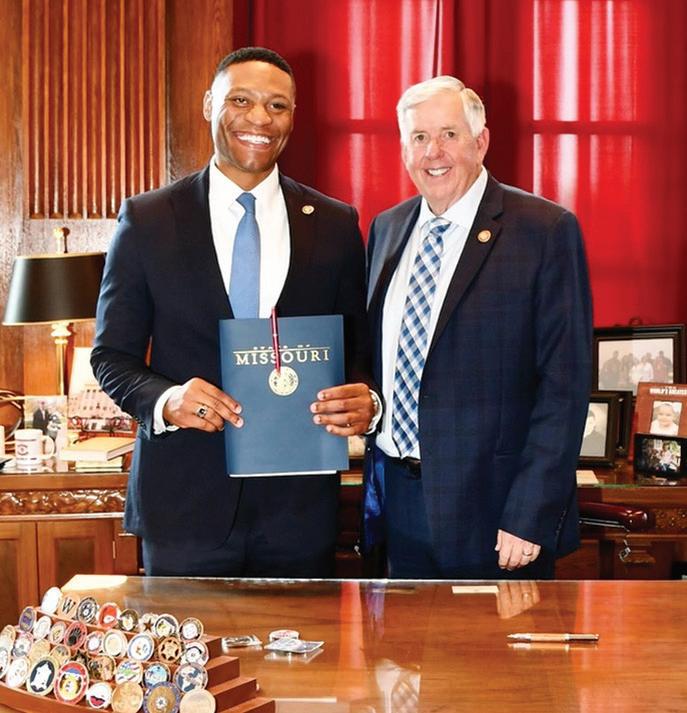

Are you looking for quality child care or struggling due to COVID -19?
Enroll your child, ages 6 weeks to 5 years, in the Childcare Center at Guardian Angel Settlement Association and allow us to assist you and your child today!
Our center is State Licensed and Missouri Accredited.
All of our teachers have a Bachelors Degree and/or Early Childhood Certification.
We have implemented changes to reduce the spread of COVID-19.
Our classrooms are inclusive of children with disabilities.


Our center is accessible by local public transit services.
Visit our website for additional information

Have you, or someone you know, experienced loss of a job or home due to COVID-19, and are looking for quality child care?
Enroll your child ages 6 weeks to 5 years into the YWCA St. Louis Early Education Program. Go to www.ywcastl.org to begin the enrollment process today!







Because our children are worth it.
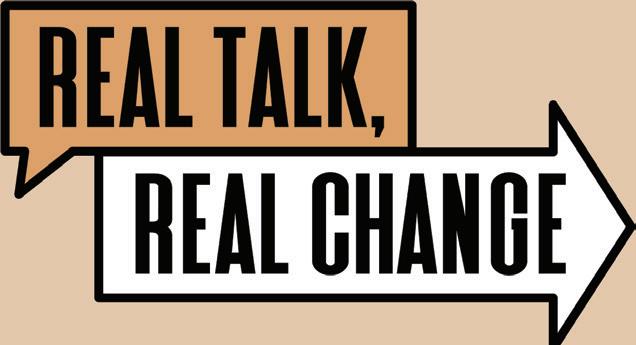
Real Talk, Real Change returns with a candid discussion, in episode three, on the racial disparities in our education system, and more importantly, what can be done to rebuild it.

























By Danielle Brown The St. Louis American
The Kranzberg Arts Residencies for Individuals program grants local creatives the opportunity to dream a big dream.
“We are thrilled to launch our redefined and reimagined Kranzberg Arts Residencies for Individual Artists,” Chris Hansen, executive director of the Kranzberg Arts Foundation said.
“This is an opportunity for individual artists to build capacity and have the tools, the spaces and the time they need to manifest one of their greatest artworks.”
With more than $2 million in annual regional subsidies, visual arts (five residents accepted), musicians (four), writers (two) and filmmakers (one) will have the opportunity to bring a big
Nonprofit enriches youths through golf and financial literacy
By Danielle Brown
The St. Louis American
Four years ago, Jerome Harris Jr. worked for a nonprofit organization called St. Louis Urban K-Life. It provides north St. Louis teens with mentorship, professional and collegiate advice, financial literacy education and access to resources often not found in their communities.
K-Life now partners with PGA Reach Gateway, a recreation and sports fundraising and fund distribution agency that exposes underserved youth to golf.
“They supported me financially to go into the schools and expand the game of golf to communities and areas that did not have access nor exposure to the game.,” Harris said. “We went into Clyde C. Miller Career Academy and taught intro to golf in the gym class.”
The Kranzberg Arts Foundation launched its Music
Brown, Scooter Brown, Brady Lewis, Mark Harris II.
n “This is an opportunity for individual artists to build capacity and have the tools, the spaces and the time they need to manifest one of their greatest artworks.”
- Chris Hansen, executive director of the Kranzberg Arts Foundation
project to fruition. The residencies have five pillars beneficial for every participant including workspace, presenting space, technology, tools and training. There is also marketing and storytelling sup-
port, a partner resource and stipend.
Workspace is designed to meet the needs of each resident providing them with office spaces, conference rooms, rehearsal rooms, artists studios and more.
Each resident has a chance to showcase their work in a performance or exhibition space. KAF venues feature technology, systems and staffing that help enhance productions and presentations.
Residents are introduced to KAF ‘s “ecosystem” of training opportunities that complement their use of featured venues, technology and tools. It also incorporates participation in KAF’s core principles and “Heart & Soul,” its guest experience training program.
All residents receive a 10-day block of 60-second radio spots on KDHX and/or WSIE to assist in the promotion of their work. KAF
See Residency, B8
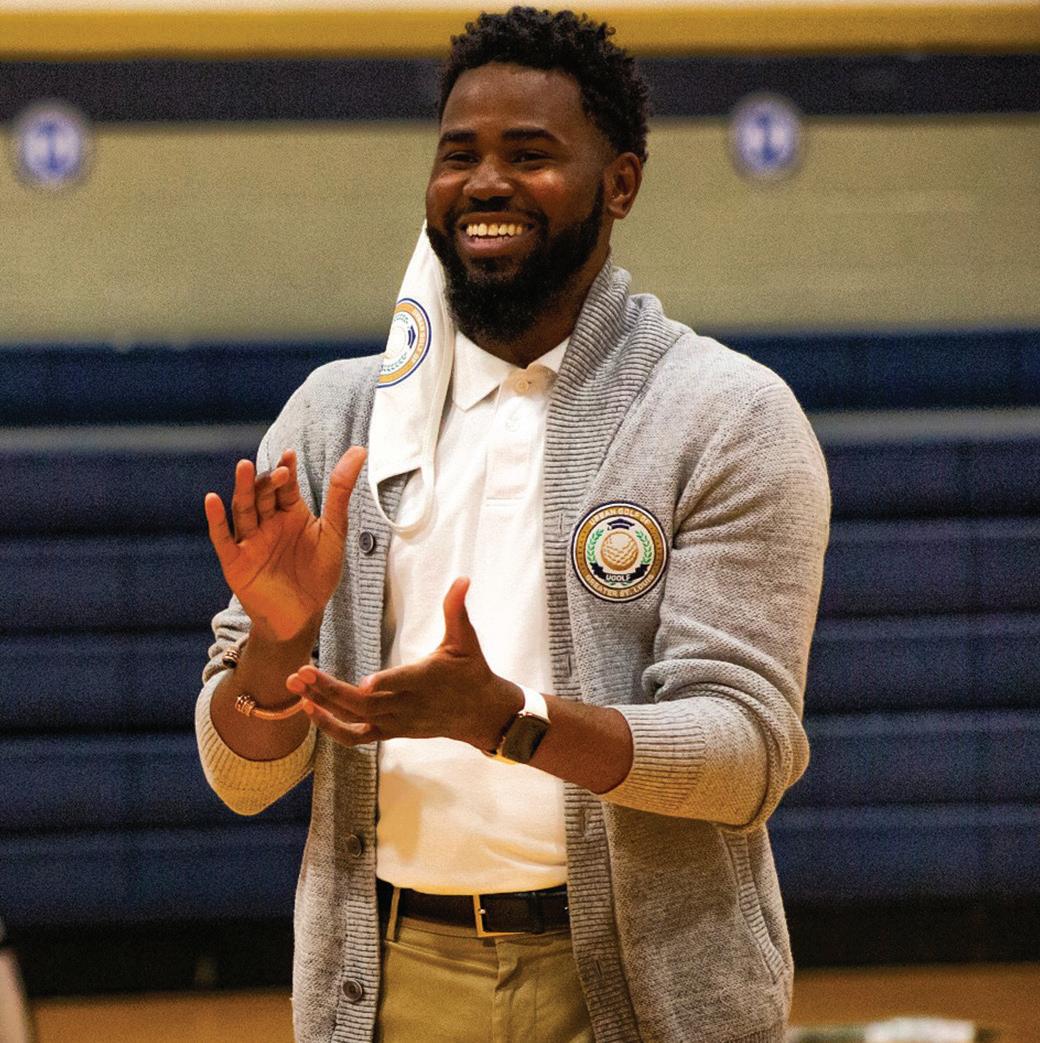
Harris said after about six-to-eight weeks, they rolled out an after-school program, which focused on students’ emotional and social learning, academic growth, financial literacy education, conflict resolution and community service.
“We used golf as a tool to expose and develop our kids.” Harris said. Harris’ work with K-Life motivated him to leave that nonprofit and launch his own nonprofit organization, Urban Golf. Gateway was its first funding source.

Biz Markie, “Clown Prince of Hip Hop” leaves legacy of timeless music
By Danielle Brown
The St. Louis American
“Oh baby you, you got what I need, but you say he’s just a friend.”
Unphased by his vocal ability, Biz Markie confidently sang on the 1989 catchy tune, “Just A Friend,” to a lady who piques his interest, but seems to already have a current relationship. That doesn’t bother him one bit, though, as he continues to express his admiration toward her throughout the song. Today, the song is just as big, if not more popular, than it was more than 30 years ago. It has since been featured in numerous television commercials including Radio Shack, Heineken and Papa John’s.
It’s heard on television shows, in movies and on samples by other artists. It is probably most recognizable in Grammy-nominated singer Mario’s “Just A Friend.”
“The weirdest thing about my fame is that when I’m thinking that it’s almost over it just sparks back up,” Biz Markie told The Washington Post in a 2019 interview.
Jerome Harris Jr.’s work with K-Life motivated him to leave that nonprofit and launch his own nonprofit organization, Urban Golf, with a similar mission. Gateway was the first funding supporters of the organization.
n “He didn’t miss a beat, human beatboxing and singing A cappella without amplification. He could not be stopped.”
- Mike D Beastie Boyz
“I made “Just a Friend” in ’89. Some people’s records die. It sprouts up. Now it’s 30 years later and it’s sprouted up again in commercials. They’re not letting me die. The public, the fans, they like me around.”
It’s certainly a song that will forever be remembered and ingrained in our minds.
Markie, a jovial spirit and prankster, died on July 16, 2021 at age 57. His manager Jenni Izumi confirmed his death in a statement to USA TODAY.“It is with profound sadness that we announce, this evening, with his wife Tara by his side, Hip Hop pioneer Biz Markie peacefully passed away. We are grateful for the many calls and prayers of support that we have received during this difficult time,” read the statement.
“Biz created a legacy of artistry that will forever be celebrated by his industry peers and his beloved fans whose lives he was able to touch through music, spanning over 35 years. He leaves behind a wife, many family members and close friends who will miss his vibrant personality, constant jokes and frequent banter.”
Genesis Peck, sophomore at University of Central Missouri studying kinesiology, is a former K-Life student who began a similar program.
“U Golf is fun, it’s not just about golf,” Peck said.
“Lifelong bonds and networking opportunities are formed through the organization that will help you through your whole life.”
Markie, born Marcel Theo Hall on April 8, 1964 in Harlem, was raised in Long Island. He told Tim Westwood, British DJ and radio/tv personality, in a 1988 interview he got his name for being busy getting in trouble and because his name is Markie.
During his teenage years his love for hip-hop sparked after hearing tapes from the “L” Brothers. He became enamored with the artform. Not long after, he toyed with crafting his own rhymes and beatboxing.
He became a force as a DJ, human beatbox and





a domestic and sexual violence program Presents a Panel Discussion on
Thursday, July 22, 2021 from 6:00-7:00PM
The event can be seen live on youtube.com search for LSCOfficial
You don’t want to miss this panel.
Dr. Naaman Lauderdale, Mental Health Therapist, First Choice Counseling Andrienne R. Petty, Substance Abuse and Trauma Therapist
Elizabeth Makulec, KUTO Kids Under Twenty-One, Suicide Preventionist Gloria McQueen, Moderator, Women of Grace will present information and answer questions regarding the impact of COVID 19 on relationships, as it relates to domestic violence, mental health, drug misuse and youth at risk of suicide. For more information contact 314-652-9196.
Are you or someone you know a victim of domestic or sexual violence or at risk of suicide? Seek help soon.
Hotline: 314-652-2572

Now on view
Oliver Lee Jackson is known for creating complex and layered images in which figurative elements emerge from abstract fields of vibrant color. Now on view, the 12 paintings, drawings, and prints presented in this exhibition were created from the mid-1960s through 2020, demonstrating his significance as a highly experimental artist working across a range of media.
Jackson was associated with the Black Artists Group, which was founded in St. Louis in 1968, and a close friend of comember and jazz saxophonist Julius Hemphill. Many of the works on view are loans from Donald M. Suggs, a local collector and close friend of Jackson’s.

By Mikall Venso, Missouri Historical Society
The forced eviction and incarceration of Japanese Americans during World War II is the subject of Righting a Wrong: Japanese Americans and World War II, a traveling exhibition from the Smithsonian that opens Saturday, July 24, at the Soldiers Memorial Military Museum.
One could argue that the uncertainty that followed the surprise attack by Japanese forces on Pearl Harbor, Hawaii, on December 7, 1941, clouded the judgment of many Americans in the next days and weeks. As the US entered World War II, the nation’s leaders faced the challenges of conducting a war on two fronts (Asia and Europe) far from home and protecting the home front that was essential to the nation’s security and wartime personnel and production needs. The potential threat of subversive action and questions of loyalty caused many in power to raise concerns about Japanese, Germans, and Italians living in the United States— immigrants as well as their American-born children and grandchildren.
Under the umbrella of national defense and the stated goal of limiting espionage and sabotage to military equipment, premises, and utilities, President Franklin D. Roosevelt signed Executive Order 9066 on February 19, 1942. This presidential order gave full authority to the secretary of war and military commanders to designate military zones around the country and to exclude, remove, and detain individuals from such areas. These zones and incarcerations focused overwhelmingly on Americans of Asian rather than European descent. Within two weeks, General John DeWitt, commanding general of the Western Defense Command, created two military zones of exclusion that encompassed more than half of Arizona, California, Oregon, and Washington and parts of Alaska.
From late March to August 1942, about 112,000 men, women, and children of Japanese heritage were evicted from their communities along the West Coast. Approximately 75,000 (67%) were American citizens whose rights were summarily disregarded. They were forced to abandon their jobs, businesses, homes, and
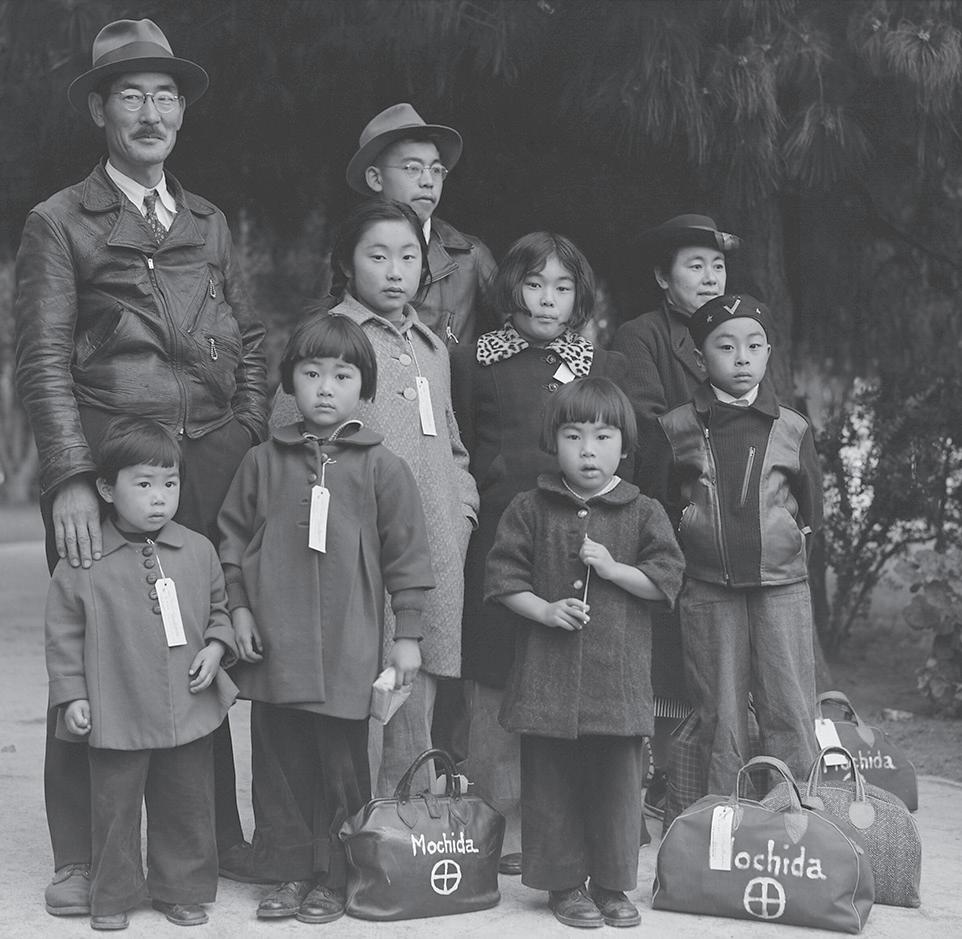
nearly all belongings as they were held against their will behind barbed wire and under armed guard in 10 inland concentration camps—at the time called “relocation centers”—in Arkansas, Arizona, California, Idaho, Utah, Wyoming, and Colorado for up to four years.
Righting a Wrong explores this difficult chapter in American history. The exhibit traces the story of this incarceration and the people who survived it as well as the story of Japanese Americans who served in the US military through heart-wrenching personal narratives, fascinating documents, stunning photographs, and engaging interactives.
As part of the Soldiers Memorial stop on the exhibit’s nationwide tour, local connections to this powerful story will be highlighted. Despite being thousands of miles away from the front lines of the removal of tens of thousands of Japanese Americans, St. Louis played a pivotal role for many seeking alternatives to the oppressive efforts to “protect” the nation.
One way that Japanese Americans on the West Coast could avoid internment at the camps was through higher education. At the time, Washington University in St. Louis was one of a few campuses that welcomed Japanese
students. Among the approximately 30 students accepted at Washington University in the fall of 1942 were two young architecture students from California, Richard Henmi and Gyo Obata. The Gateway City would prove to be a supportive and nurturing community that became a new home for them, their families, and an extended community of Japanese Americans as well. Henmi and Obata went on to independently create iconic buildings that still grace the St. Louis landscape and to build renowned architecture firms that have created generations of creative opportunities for others. Both men also served in the US Army during World War II along with tens of thousands of Japanese Americans, including many who had been and whose families remained incarcerated. Virtual programs on July 22, August 17, and August 31 will explore these stories and more. We invite you to visit Soldiers Memorial to experience Righting a Wrong, which will be open July 24 to October 3, 2021. Admission to this special exhibit is free, and audio description is available. Learn more at mohistory.org/exhibits/ righting-a-wrong.
This article was adapted from a post on History Happens Here, the blog of the Missouri Historical Society.

St. Louis American staff
The African Methodist Episcopal Church, established in 1787 and the world’s oldest Protestant denomination created by persons of African descent, had held a conference every four years since 1816. Its 51st Quadrennial Session, which was pushed back a year because of COVID-19, convened July 6 in Orlando, Florida, and its review of laws and policies made national news. Delegates from across the world discussed racial issues, voting rights and the Black Lives Matter movement. The church vowed words will become action.
“Our church claims to have the issue of justice in its DNA,” Senior Bishop Adam J. Richardson Jr. said.
“It will come up in sermons, it will come up in reports,” the Associated Press reported. AME Church bishops also

released a statement addressing Critical Race Theory and systemic racism in a global context.
“We acknowledge the current controversy around Critical Race Theory and acknowledge that healing can only begin when the traumas of the past are recognized,” the bishops wrote.
“In African Methodism, our strategy will be informed by the notion that racism is the root evil and that ending racism is one of our highest priorities. We need partners in the fight against race-inspired ills that continue to cry out against inequities beyond the borders
AME Church Senior Bishop Adam J. Richardson Jr. said his denomination has “justice in its DNA” during the 51st Quadrennial Session in Orlando, Florida last week.
courtesy of Religion News Service
of the USA.”
“We must signal to public officials that the actions taken are more important than the proclamations made.”
Ravi Perry, chair of the Howard University political science department, urged the denomination to repeal its opposition to same-sex marriage.
Similar debates have occurred in several historically white denominations.
The Presbyterian Church (in America) and the Episcopal Church have authorized their clergy to officiate same-sex marriages. The issue of ordaining gay clergy members is also being debated in the United Methodist Church, which has many Black members.
“If any Black church is going to do this first, it’s going to be the AME Church,” Perry said. “My hope is the AME Church will remember its social inclusion roots.”
Many African and Asian delegates voted with conservative American delegates during the United Methodist Church gathering in St. Louis two years ago to defeat the proposals. This will most likely lead to a split into two separate churches in 2022.
An immediate repeal of the AME’s stance was voted down, but Richardson said there is “an evolution underway that mirrors trends in broader society.”
Jesus was antitheology, but pro-faith
It is ironic to me that so many different churches profess the belief that Jesus Christ is the Son of God, was crucified, died, was buried to arise again on the third day and sits at the right hand of His Father in heaven.
From Catholic to Pentecostal, from Baptist to Presbyterian, from Episcopalian to Methodist, from Church of God in Christ to Lutheran, from
Evangelical to just being saved. Each denomination wants to set itself apart based upon its doctrine being more in line with God than any of its Christian cousins.
Throughout history so-called Christians have persecuted other so-called Christians in the name of being more in tune with God’s Word. The more I read the Bible, the more confusing this
becomes - or the more ridiculous. As a point of reference in my own faith walk, one of the things that got in my way was the decision about which church to join. I was introduced to rural Baptist traditions by my grandmother, only to be baptized Catholic as a young boy.
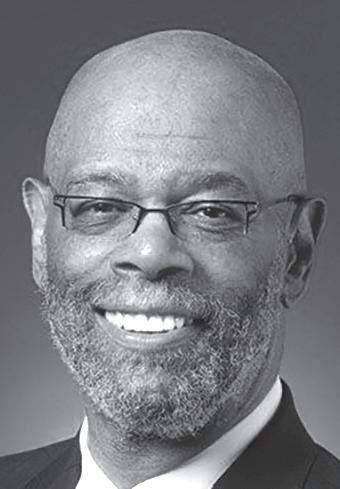
Subsequently I have not followed any particular religion most of my adult life. Even now I sometimes question which church I should attend, only to have the Lord slap me with the fundamental question:
“How does where you go to church have anything to do with my Son’s ministry?”
When you think about it, do you really believe God is pay-
ing attention to the marquee of the church you attend?
Do you really believe that where you go to church on Sunday carries more weight with God than what you do on the other six days of the week?
When I get confused on this issue, I’m reminded to pick up a Bible and rekindle the notion that faith is an internal measurement that refuses to succumb to external pressures. In this instance, the external pressure is manmade and not God sent. For those who believe their religion or theology is better than someone else’s, they surely have missed the entire point of the life and
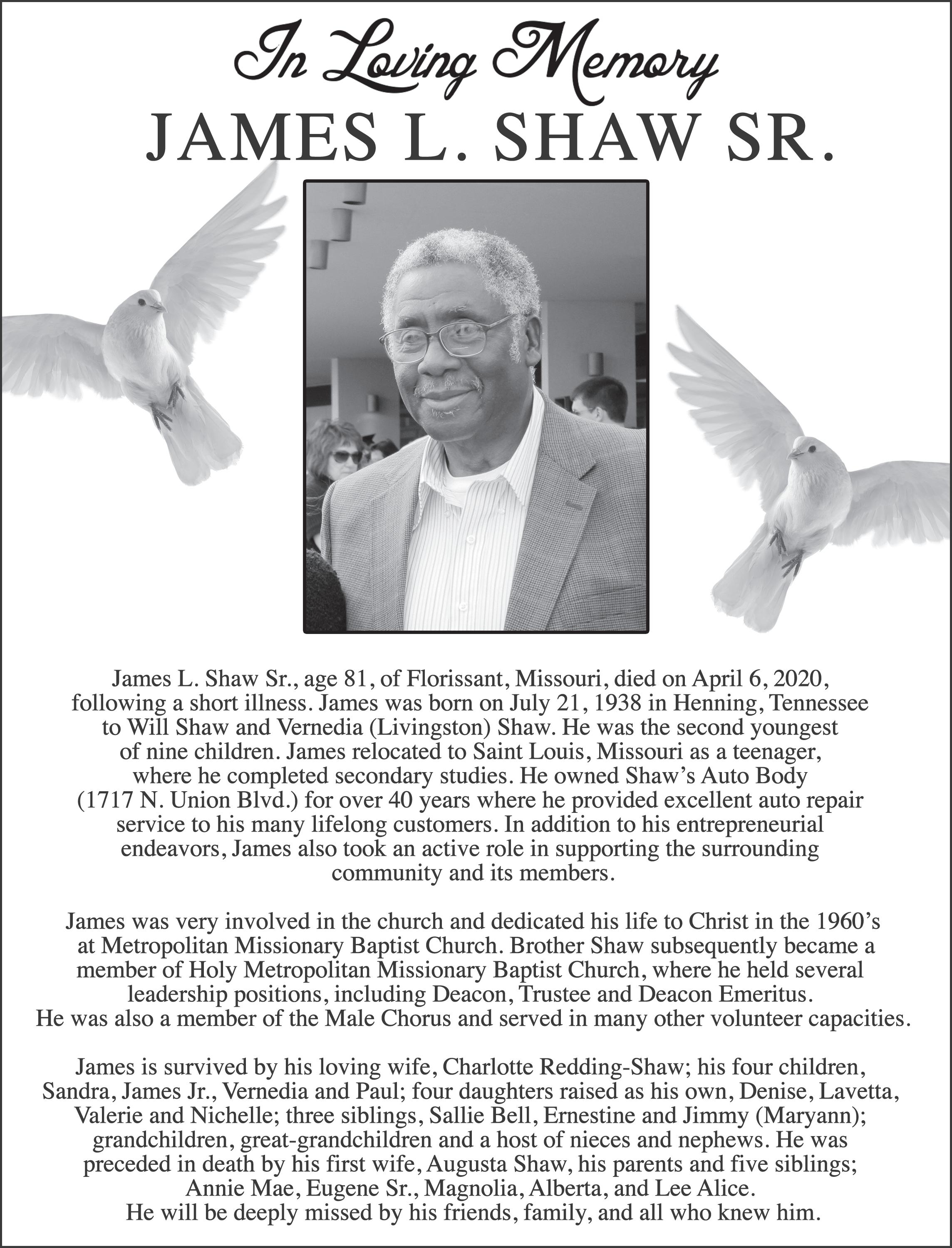
times of Jesus Christ. My reading of scripture confirms for me, maybe not for you, that Jesus was antitheology and pro-faith. I mean we are talking about someone who rather angrily turned over tables in the Temple because He was insulted by the goings on there; something to do with not using his Father’s house for prayer, but rather as a den for robbers. Everything Jesus stood for seems to translate into acts of faith, acts of worship, acts of love and kindness and forgiveness and yes, acts of mercy. These acts don’t confirm for one moment that one person’s religion is better or more meaningful than the religion practiced in the church up the street or around the corner. If Jesus were alive today, would you be Sadducees or Pharisees?
Would you be Jew or Roman?
Would you be a member of the Sanhedrin? Either way, if you were not carrying out the will of God the Father, you more than likely would have problems with God the Son. You see the Law, your religion, your theology will be forever secondary to the will of God. Now I didn’t say this. Jesus did. In closing let me confirm that there is no better place to follow the simple edict, practice what you preach, than in church. Which church is quite irrelevant as I see it?
“For we are God’s workmanship, created in Christ Jesus to do good works, which God prepared in advance for us to do.” Ephesians 2:10. May God bless and keep you always.




St. Louis & St. Charles Area Call Karen at 314-298-7002

$17.51/ hour 1st, 2nd & 3rd Shift
Material Handlers are responsible for performing a variety of routine hazardous and non-hazardous waste tasks in the movement of solids and liquids. Tasks could include all types of manual labor in cleaning and decontamination operations, vacuum projects and handling, packing, re-packing, unloading and loading containers for processing at site or transportation to appropriate facilities.
Education/Experience: High School diploma or General Educational Development (GED)
Prior work in the hazardous waste or chemical industry and/or forklift experience preferred but not required (We’ll train!)
Apply today, we would love to hear from you! For more information, visit our website at www.veolianorthamerica.com or contact: Darrell Lewis Human Resources Business Partner 618-857-7322 darrell.lewis@veolia.com
Summary
The Administrative Specialist reports directly to the deans, providing a variety of services which relieve them of administrative details. This position supports deans and various directors of school-wide initiatives by performing a wide range of complex and confidential administrative and clerical support duties. Consistent with excellent communication and interpersonal skills and the ability to provide information and service to a wide range of contacts. This position requires the ability to be self-motivated, initiate and learn the school’s and departmental policies and procedures. A successful candidate must be committed to working with a diverse and inclusive community. This position is subject to a 90-day trial period. Interested candidates email resume and cover letter to dstauffer@eden.edu
Operations CoordinatorAssist ED w/ financial management & oversight & manage office operations of statewide environmental org. 32 hours/week, $18-$22/hour, 100% paid health insurance. Email resume to jobs@moenviron.org with subject line Operations Coordinator by 8/16/21. See moenvironment.org/careers for full listing.
Twain Financial Partners is hiring a Client Services Accountant. Bachelor’s degree required. For more information or to apply, please visit https://twainfinancial.com/about-twain/ careers-2/
Thursday, July 22, 2021 from 11 am - 1 pm Gary Gore Community Center 2545 Dorwood Drive, Jennings, MO 63136
We will have onsite interviews for custodians, general maintenance, food service and substitute teachers. For more information contact Human Resources at 314-653-8000
The Gateway Arch Park Foundation is seeking to fill the following open full-time position. Stewardship Manager for Individual Giving: Position requires a bachelor’s degree with 3-5 years of professional experience. View full job descriptions and application process at www.archpark.org
Justine PETERSEN, a Non-Profit focused on credit building, homeownership, and micro-enterprise lending and training is accepting applications for a Finance Associate. To apply go to justinepetersen.org/getinvolved/job-opportunities/
Join a great team with an Employees First approach that’s helped make St. Peters one of the best places to live in America! Various FT and PT positions with competitive pay at multiple city facilities including St. Peters Rec-Plex, Water’s Edge Banquet Center and St. Peters Golf Club. To view all current openings and to apply, please visit www.stpetersmo.net/Jobs

Membership & Volunteer Coordinator-grow the # of members & engage volunteers throughout MO for statewide environmental org. 40 hours/ week, $39-$43K, 100% paid health insurance. Email resume to jobs@moenviron.org with subject line Membership and Volunteer Coordinator by 8/16/21. See moenvironment. org/careers for full listing.

Seeking student referrals for a FREE afterschool Academy college preparation Program in the Fall. For more information or to refer a student visit us at www.bhghstl.org or call 314-280-5465.

You may have what it takes to be successful in the construction industry if you are…
- Dependable
- Someone that enjoys hands-on work
- Someone that works well in a team environment
- Someone that is looking for a career with room for growth
- Someone that wants to help build their community
Associated Builders and Contractors Heart of America is accepting applications for its Pipefitting and Plumbing Apprenticeship programs. All programs take place at our Eastern Missouri Training Facility.
To apply you must be 18 years or older, attend a scheduled orientation, and submit an application including the following documents in person: Valid Driver’s License High School Diploma or Transcripts or a GED Certificate DD214 – Veteran Documentation (if applicable) Please visit www.abcksmo.org for more information and to complete an interest form in your trade of choice. Staff will contact you to schedule a time for you to attend an orientation.
All minorities, including women, are encouraged to apply. The recruitment, selection, employment and training of apprentices during their apprenticeship shall be without discrimination because of race, color, religion, national origin, sex, age, creed, disability or sexual orientation. All contractor members are Equal Opportunity Employers.
Paric Corporation is seeking proposals for the following project: Missouri Teaching Hospital Fitout Space 2W for the University of Missouri in Columbia, MO.
This is the renovation of the 2nd floor of the Teaching Hospital. The project consists of approximately m 7,770 SF of space and includes but is not limited to demolition, carpentry, architectural woodwork, fire stopping,Doors/frames/hardware, drywall, tile, acoustical ceilings, flooring, painting, fire sprinklers, plumbing, HVAC and electrical work.
This project has a diversity participation goals of 10% MBE,m10% combined WBE, DBE, Veteran Owned Business and 3% SDVE.
Bids for this project are due on July 27th, at 2:00 p.m. For any questions or would like to find out more detailed information on this opportunity, please contact John Davis at 314-704-6075 or jcdavis@paric.com.
All bids should be delivered to Paric via e-mail (bids@paric.com) or fax (636-561-9501).
PARIC CORPORATION IS AN EQUAL OPPORTUNITY EMPLOYER
Reinhardt-Wilson Joint Venture is requesting bids for Missouri University New Indoor Practice Facility . Bids must be submitted by T uesday, August 3rd, 2021 at 1:30 pm.
Bid Documents will be available at BuildingConnected.com https://app.buildingconnected.com/projects/ 60ef3e1d0f5aca00a2872877/info
You can view the project by logging into the Building Connected site and setting up a free account on their Website.
The Bailey Foundation invites the submission of sealed bids from qualified food service management companies for the preparation and delivery of meals to its centers. Prospective bidders must be capable of providing breakfast, lunch, snacks and suppers for up to 2,000 children ages 1-18, 7 days a week for 365 days per year. The bids should take into account all applicable U.S Department of Agriculture (USDA) requirements.
Bids must be received by 9:00 am on Monday August 2, 2021 at 4625 Lindell Blvd. Ste. 200. St. Louis, MO. 63108, at which time they will be opened to the public, read, and recorded. Interested parties may obtain the service specifications and bid forms by calling Ciara Warren at (314) 470-8295 or sending an email to programs@ thebaileyfoundation.org
Sealant Replacement
Argyle Garage
Will be received by City of St. Louis Treasurer UNTIL 3:00PM 7/29/2021 For specific project information, go to https://www.stltreasurer.org/ Request for Proposals/
The Saint Louis Zoo seeks bids from qualified contractors to submit proposals for Sears Lehmann Jr. Wildlife Reserve Perimeter Fence Repair RFP 2021. Bid documents are available as of July 21, 2021 on the Saint Louis Zoo website: stlzoo.org/vendor
Ferguson-Florissant School District is requesting bid proposals for the purchase and installation of two modular ramps until Friday, July 30th, 2021, 1:30pm CST. Bid specs must be obtained online at http://new.fergflor.k12.mo.us/ facilities-rfq.
Contact/Attention: Matt Furfaro 314-824-2418
Alberici Constructors and the Saint Louis Zoo seek bids from qualified construction firms to submit proposals for multiple projects at the Saint Louis Zoo WildCare Park. Projects consist of Building Re-Roofing, Building Demolition and Perimeter Fencing & Roadways. To request bid documents, please send an E-mail to stlzoobids@alberici.com
Sealed Proposals for B22-1208 Inductively Coupled PlasmaMass Spectrometry (ICP-MS) will be received at Lincoln University Purchasing Dept 1002 Chestnut St, RM 101 Shipping & Receiving Bldg, JCMO 65101 until 2PM CT on 03Aug2021. Download Proposal Request at http://www.lincolnu.edu/web/ purchasing/bids
Bids for Replace
MSHP Troop Headquarters, R
, P
. R2113-01 will be received by FMDC, State of MO, UNTIL 1:30 PM, August 24, 2021. For specific project information and ordering plans, go to: http:// oa.mo.gov/ facilities
Bids for Stream Bank Restoration P h a s e I I , Castlewood State Park, Project No. X2002- 02, will be received by FMDC, State of MO, UNTIL 1 : 3 0 P M , 8/12/2021 via MissouriBUYS. Bidders must be registered t o b i d . F o r specific project information, go to: http://oa.mo. gov/facilities
Curtiss-Manes-Schulte, Inc. is soliciting bids from MBE/WBE/ SDVE/DBE subcontractors and suppliers for work on the New Indoor Practice Facility, University of Missouri-Columbia. Bids are due Tuesday, August 3rd, 2021 by 1:00 pm and can be faxed to (573) 392-4527 or emailed to shawn@cms-gc.com For more information, call Shawn @ (573) 392-6553. CurtissManes-Schulte, Inc. is an Equal Opportunity Employer.
The Saint Louis Zoo seeks bids from qualified firms to submit proposals for Utility Installation 2021. Bid documents are available as of July 21, 2021 on the Saint Louis Zoo website: stlzoo.org/vendor
BID NOTICE
K&S Associates, Inc. is soliciting MBE/WBE/SDVE/DBE/VBE for the following project for August, University of Missouri, ColumbiaNew Indoor Practice Facility, City Of Brentwood-Lawn Event/Comfort Station BuildingPlans and Specs can be viewed at www.ksgcstl.com-submit bids to estimating@ksgcstl.com or Fax 314-647-5302
METROPOLITAN ST. LOUIS SEWER DISTRICT ST. LOUIS, MISSOURI
Bissell & Lemay WWTF Fluidized Bed Incinerators
Notice is hereby given that The Metropolitan St. Louis Sewer District (District) will receive electronic Statements of Qualifications for Design-Build Services for the Bissell & Lemay WWTF Fluidized Bed Incinerators under Letting No. 12565-015.8, at its plan room, WWW.STLMSDPLANROOM.COM, until 2:00 PM on Friday, September 24, 2021. All Statements of Qualifications are to be addressed to the Attention of Mr. Rich Unverferth, Director of Engineering and must be submitted and received by the Plan Room. No submittals will be accepted after the 2:00 PM deadline.
The Project is summarized as follows:
Alternate Locations: http://operationswebapps.missouri.edu/pdc/adsite/ad.html
McGraw-Hill Dodge
On-Line Services Only - McGraw-Hill Construction/Dodge https://www.construction.com/access-my-account
Reinhardt-Wilson is an Equal Opportunity Employer

Roanoke Construction has been selected to be the General Contractor for the construction of the Elm Ridge Senior Apartments located in Hazelwood, MO. The proposed building is 49,980 SF and consists of (50) one and two bedroom units.
The project site work includes but is not limited to site work grading, site utilities, concrete and asphalt paving and landscaping. The building consists of a three story wood frame building with grade beam foundations, masonry, composite siding, hollow metal doors and frames, vinyl windows, asphalt shingle roofing, gutters and downspouts, drywall, painting, vinyl and carpet flooring, cabinets, elevators, fire suppression, split HVAC systems, plumbing and electrical packages. We anticipate that construction of this project will begin in October of this year and will take one year to complete.
This project is NOT tax exempt and does not require prevailing wages. Minimum 25% MBE and 5% WBE participation will be required for the project. All questions should be submitted via email to Jacqueline True Director of Preconstruction bids@roanoke-construction.com
www.roanoke-construction.com
The District desires to qualify Design-Build (DB) teams for the design and construction of a fluidized bed incineration (FBI) system through a Fixed-Price Design-Build contract at two (2) of its treatment facilities: the Bissell Point Wastewater Treatment Facility (WWTF); and, the Lemay WWTF.
The new FBI systems will include the incinerator reactors, heat exchangers, blowers, emissions control equipment, ash handling equipment, ductwork, controls, and associated items. The District has pre-qualified Suez Water Technologies & Solutions USA, Inc. as the FBI Vendor / ISS Lead.
Preliminary FBI capacities (firm) are as follows:
• Bissell Point 240 dry tons per day (dtpd) with four units nominally sized for 80 dtpd each.
• Lemay 160 dtpd, with three units nominally sized for 80 dtpd each.
New sludge dewatering processes will also be provided at both WWTFs as part of the design-build contract. Centrifuges will be used to dewater a combined blend of primary sludge, WAS, and scum flow prior to incineration. Sludge cake conveyance from the dewatering centrifuges will be by hydraulically driven piston pumps and will include screw conveyors as needed.
All new equipment and related systems associated with the new incineration and dewatering processes will be located in a new Solids Processing Building constructed at both Bissell Point and Lemay facilities.
Both facilities will be procured as one project using a fixed-price design-build project delivery method. A design-build team will be selected based upon a technical scope of work and fixed price submitted by proposing design-build teams in response to a request for proposal issued by MSD.
Statements of Qualifications will be received from all companies meeting the requirements of the RFQ Documents. Prequalification of DB teams is not required in order to submit a Statement of Qualifications.
RFQ Documents are available for free electronic download. Please go to MSD’s Planroom (www.stlmsdplanroom.com). RFQ Documents are also available for viewing or purchase at Cross Rhodes Reprographics located at 2731 S. Jefferson Avenue, St. Louis MO 63118. All DB teams must obtain a set of RFQ Documents in the name of the entity submitting the Statement of Qualifications. The Metropolitan St. Louis Sewer District is an Equal Opportunity Employer.
The following people are in debt to Gateway Storage Mall of Belleville. The contents of their storage unit(s) will be sold at auction to compensate all or part of that debt.
Auction at the Belleville Royal Heights location will be held online with www.storageauctions.com on, July 27th 2021, at 10:00 AM. A cash deposit will be REQUIRED for all winning bids.
Royal Heights --Belleville: F04 – Twansley Lashley
For all rules, regulations and bidding process, please contact www. storageauctions.com . All other questions, please call 618-233-8995 or mail: 17 Royal Heights Center, Belleville, IL 62226.
Sealed Proposals for B22-1205 56 Passenger Buses will be received at Lincoln University Purchasing Dept 1002 Chestnut St, RM 101 Shipping & Receiving Bldg, JCMO 65101 until 2PM CT on 26July2021. Download Proposal Request at http://www.lincolnu.edu/web/ purchasing/bids
Great Rivers Greenway is issuing this Request for Proposals to purchase the properties at 1245 – 1251, 1246 and 1300 Lewis Street. Go to www.greatriversgreenway.org/ jobs-bids and submit by August 10, 2021.
The St. Louis County Department of Transportation is requesting the services of a highly-qualified consulting engineering firm to perform professional engineering services for the North Villanova Drive Sinkhole Repair, St. Louis County Project No. CR-1846.
Full details for this project, including submittal requirements and deadline, will be available on July 12, 2021 from the St. Louis County Web Site (www.stlouiscountymo.gov)
K&S Associates, Inc. is soliciting MBE/WBE/SDVE/DBE/VBE for the following projects for July, STL CO Police #3, Special School District-So County Technical HS & City of Olivette-Warson Park –Plans and Specs can be viewed at www.ksgcstl.com-submit bids to estimating@ksgcstl.com or Fax 314-647-5302
Notice is hereby given that The Metropolitan St. Louis Sewer District (District) will receive sealed bids for Dekamay Drive Storm Sewer (MGJB-130) under Letting No. 11535-015.1, at this office, 2350 Market Street, St. Louis, Missouri 63103, until 02:00 PM on Tuesday, August 17, 2021, at a place designated. Bids will be received only from companies that are pre-qualified by the District’s Engineering Department for: Sewer Construction unincorporated St. Louis County Drain Layers License Required Plans and
Bids for HVAC R e n o v a t i o n , Albany Regional Office, Project No. M1905-01, will be received by FMDC, State of MO, UNTIL 1 : 3 0 P M , 7/15/2021 via MissouriBUYS. Bidders must be registered t o b i d . F o r specific project information, go to: http://oa.mo. gov/facilities
Engineering, mstiebel@mcclureeng.com. Questions over the phone will not be accepted.
The Owner reserves the right to waive informalities in bids and to reject any and all bids.
Construction Estimates: $60,000 - $100,000 ADVERTISEMENT FOR BIDS
Sealed Bids for:
Plans and Specifications are also available for viewing or purchase at Cross Rhodes Reprographics located at 2731 S. Jefferson Avenue, St. Louis, MO 63118 or at www.stlmsdplanroom.com. All bidders must obtain a set of plans and specifications in order to submit a bid in the name of the entity submitting the bid.y submitting the bid. The Metropolitan St. Louis Sewer District is an Equal Opportunity Employer.

We will have a Pre-Application WAITLIST OPENING on the following dates and times:
ST LUKE’S PLAZA APARTMENTS 5602 ENRIGHT AVENUE ST LOUIS, MO 63112
June 15th thru July 30th, 2021 9AM to 12PM & 2PM to 4PM STUDIO, ONE (1) & TWO (2) BEDROOMS
Our pre-application WAITLIST will be CLOSING on the following date and time:
ST LUKE’S PLAZA APARTMENTS

5602 ENRIGHT AVENUE ST LOUIS, MO 63112
July 30, 2021 @ 4PM


Will be received by the Administration of the St. Louis Art Museum, Owner, at 1 Fine Arts Drive, St. Louis, Missouri 63110 at 2:00 p.m. on August 12, 2021. The bids will be privately opened and read. Bids from certified M/WBE contractors are encouraged.
Electronic copies of the drawings, specifications and other related contract information will be available beginning on July 13, 2021 and may be downloaded at no cost from Sharepoint (https://bit.ly/3yudY1W).
A mandatory Pre-Bid Meeting will be held on Thursday, July 15, 2021 at 9:30 a.m. on the West Loading Dock, 1 Fine Arts Drive, St. Louis, Missouri. Masks will be required for all non-vaccinated attendees.
Questions regarding the scope of work should be directed, in writing, to Jeff Scott, McClure Engineering, jscott@ mcclureeng.com. Questions over the phone will not be accepted.
The Owner reserves the right to waive informalities in bids or to reject any and all bids.
Construction Estimate: $400,000
Advertised herein is subject to the Federal Fair Housing Act, which makes it illegal to advertise any preference, imitation, or discrimination because of race, color, religion, sex, handicap, familial\status, or national origin, or intention to make any such preference, limitation, or discrimination.“We will not knowingly accept any advertising for real estate which is in violation of the law. All persons are hereby informed that all dwellings advertised are available on an equal opportunity basis.”
Call Angelita Houston at 314-289-5430 or email ahouston@stlamerican.com to place your ads today!
Continued from B1
will also archive a project’s progress throughout the residency period.
Residents earn a $1000 cash stipend and they’ll also be presented with $500 in partner resource vouchers related to their desired arts discipline.
“They sky’s the limit and
Continued from B1
rapper on New York’s local music scene. But the moment that truly defined and laid the foundation for what would become a decades-long career was when he joined the Juice Crew (Roxanne Shante, Big Daddy Kane, MC Shan, Marley Marl) as its beatbox.
it just doesn’t have to be one painting or one composition, it could be anything that they could imagine,” Hansen said. “We don’t wanna put a ceiling on it, we don’t wanna put a boundary around what is possible because the spaces are really dynamic. The access they have to tools, technology, other organizations and other artists for collaboration is really significant.”
The application process operates on a weighted scoring
He released his debut album “Goin’ Off,” in 1988 with the underground smash singles, “Vapors,” “Pickin’ Boogers,” and “Nobody Beats the Biz.” His sophomore album, “The Biz Never Sleeps,” included the commercial hit, “Just A Friend,” which peaked at number nine and spent 22 consecutive weeks on the Billboard charts.
He released other bodies of work throughout the 1990’s, and his last album “Weekend
better person than I was back then.”
“I decided to start my own organization because it’s something I’ve always wanted to do ever since I was a kid,” Harris said.
Shakyra Poke, a junior at Southeast Missouri State University studying child and family studies with a minor in criminal justice, said when she met Harris she was an “act now, think later” type of person. Her involvement with the organization caused her to react differently to situations.
Urban Golf has been operating 18 months and Harris has created several satellite centers, what he calls “a buildout of a classroom across districts.”
rubric based on how the piece is defined in relation to the five pillars and how the project is influenced by the St. Louis community or deep communal interests.
Once prospects complete their application, other artists, arts professionals and educators join and assess scores. Those who qualify are added in a lottery that goes through a diverse lens to ensure representation is present across all disciplines, races, ages and genders. After
Warrior,” was released in 2003. Although he stepped away from music, he still remained a household name through acting and cameos in TV shows and movies including “Men in Black II,” “Black-ish,” “Yo Gabba Gabba!” (where he taught kids how to beatbox), “In Living Color” and more. Markie gained a lot of love, respect and admiration among industry peers, especially fellow hip-hop musicians. As one of the contributors to the
Earlier this year, it introduced its first on-course program. Its goal is bridging the gap between students and professionals.
Professional golfers, St. Louis Cardinals players, police officers and St. Louis Mayor Tishaura Jones, who was then serving as treasurer, have volunteered.
that a blank lottery occurs and winners are selected.
“We want to make sure that everyone knows this residency is for all artists that believe they have something to say and want a shot at doing this,” Hansen said.
“What we don’t want to do is for anyone to feel discouraged by the process. We’re always here to answer questions about assembling applications or give guidance to individuals on the best methods
“Golden Age” of hip-hop, he frequently collaborated with others of that era along with befriending many of them.
Mike D of legendary hiphop trio, The Beastie Boyz paid tribute to his frequent collaborator and fallen friend via Facebook on July 17.
“He didn’t miss a beat, human beatboxing and singing A cappella without amplification. He could not be stopped,” Mike D said. “Biz, we love you and we miss you and we are so
take away and really dissect and use for the programming that we’re going to institute next,” Harris said.
U Golf is one of four local nonprofit organizations granted $250,000 on behalf of Nike’s Black Community Commitment program.
to use if they don’t have the technology that’s necessary to apply.”
The expanded program builds on the success of KAF’s Music Artist in Residence Program, launched in 2018, which helped develop and support the careers of local jazz artists and bandleaders.
“We learned a lot in that process and have now expanded and redefined our artist residency program,” Hansen said.
Submissions for the
grateful for everything we got to do together and make in the time we had.”
In a heartfelt tribute via Instagram, LL Cool J paid respects to his late friend.
“I just wanna say rest in power to Biz Mark, my friend,” LL Cool J said.
“So many memories man... you was in the basement of my grandmother’s house when I wrote ‘Rock The Bells.’ Used to always hang out back in the days we was running around
“That’s a totally unexpected blessing,” Harris said. “I’m grateful we got our foot in the door and we’re gonna represent well for St. Louis.”
2021-2022 Kranzberg Arts Residencies for Individuals opened June 15 and will close Aug. 1. Final selections will be made Aug. 15. Artist announcements will be Sept.1 and public announcements follow on Sept. 15. The residency runs from Oct. 1 to Dec. 30, 2022.
Go to https://www.kranzbergartsfoundation.org/ for more information.
Queens and Long Island.”
Markie’s cause of death was undisclosed by Izumi, but he had been suffering from complications of Type 2 diabetes for several years. Last July, he was hospitalized several weeks in Maryland for health issues related to his diabetes.
Earlier this month, he was admitted again, leading to false reports of his death.
whether it be college, trade school or employment. We are focused on developing them individually.”
Harris’ future plans for U Golf consist of golf camps and more involvement with community and recreational facilities such as the Wohl Recreation Center.
Learn more about U Golf at https://ugolfstl.org/. Learn more about K-Life at https://urbanklife.com/. Learn more about PGA Reach Gateway at https://gatewaypga.org/. Golf
“As I participated more in the program, it opened my eyes and broadened my horizons,” Poke said. “I realized there’s a better future and I’m a much
A center will be at Career Academy and will be the opposite of what Harris saw growing up in classrooms. It will include a coffee/juice bar, flatscreen TVs, turf, a golf simulator and PS5 and XBOX game systems. Every year, the organizations take students on a college tour.
It began with a Golf 101 session, which provided instruction about the sport, a lunch to socialize and fellowship and a talk led by Dr. Terry Harris, owner of The Collective STL yoga studio.
“It was so impactful, so powerful, we had a lot of information that we were able to
Other organizations receiving assistance include the Riverview West Florissant Development Corporation, People’s Community Action Corporation and Annie Malone Children & Family Service Center.
Harris’ friend suggested he apply for the program and he was overjoyed when he learned he was accepted.
U Golf works with Bellerive Country Club, Glen Echo Country Club, Missouri Athletic Club, Norwood Hills Country Club, Oak Brook Country Club and Sunset Hills Country Club.
“The mission at U Golf is simple, but powerful,” Harris said.
“It is preparing urban students for success beyond high school while introducing them to the vast community of golf. We want to make sure that our children are prepared for whatever is next in their life,
